Oregon’s rich history is on display at Fort Clatsop National Park near Astoria. Fort Clatsop is where the famous explorers Lewis and Clark and their Corps of Discovery spent the miserable winter of 1805-1806. We’ve visited this park several times, and highly recommend it as a family activity!
Table of Contents
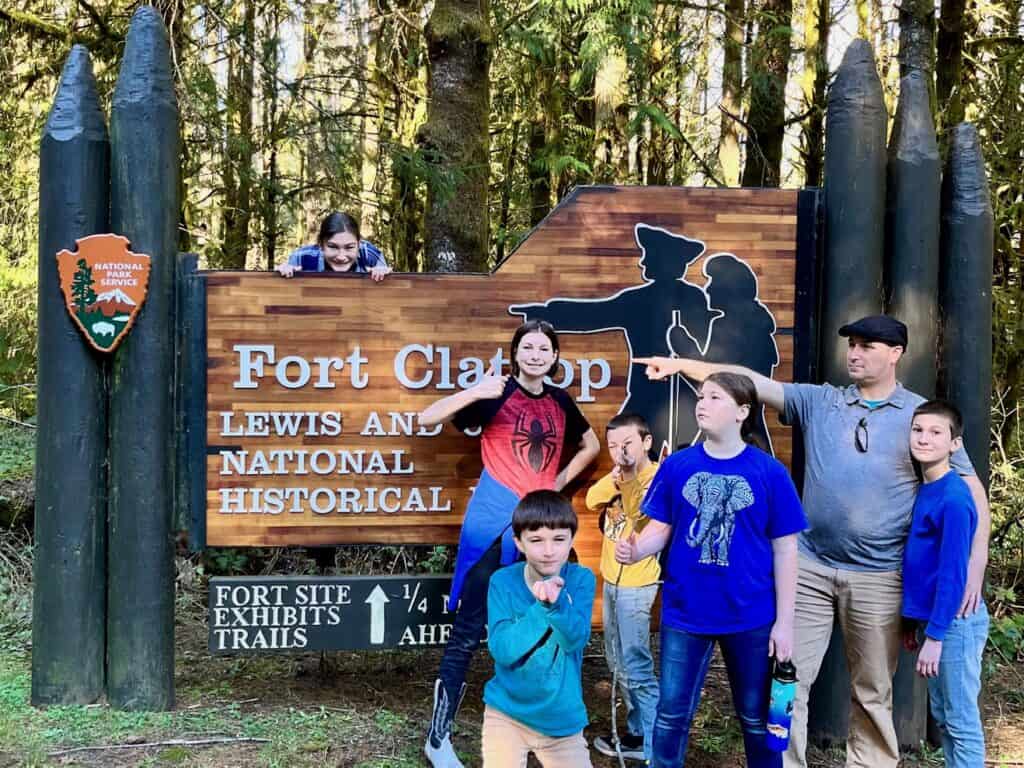
**Note: the official name of Fort Clatsop National Park is actually The Lewis and Clark National Historical Park. There are multiple other sites that have the Lewis and Clark name! So we’ll usually refer to it in this post as Fort Clatsop National Park for simplicity.
How to get to Fort Clatsop
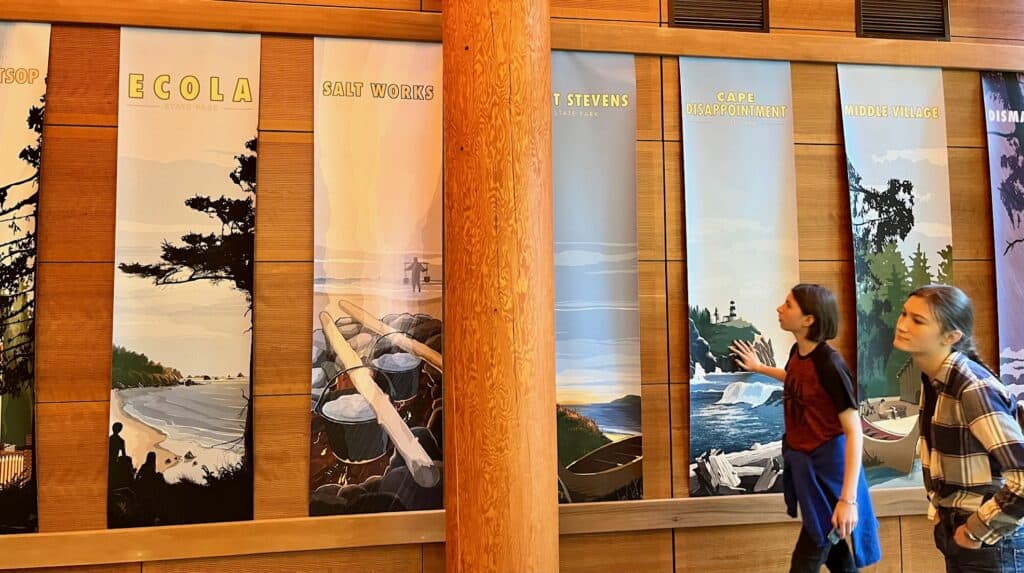
Fort Clatsop (Lewis & Clark NHP) is a unit of the National Park Service that consists of several sites in Oregon and Washington. The main park is a two-hour drive from Portland, between Astoria and Seaside.
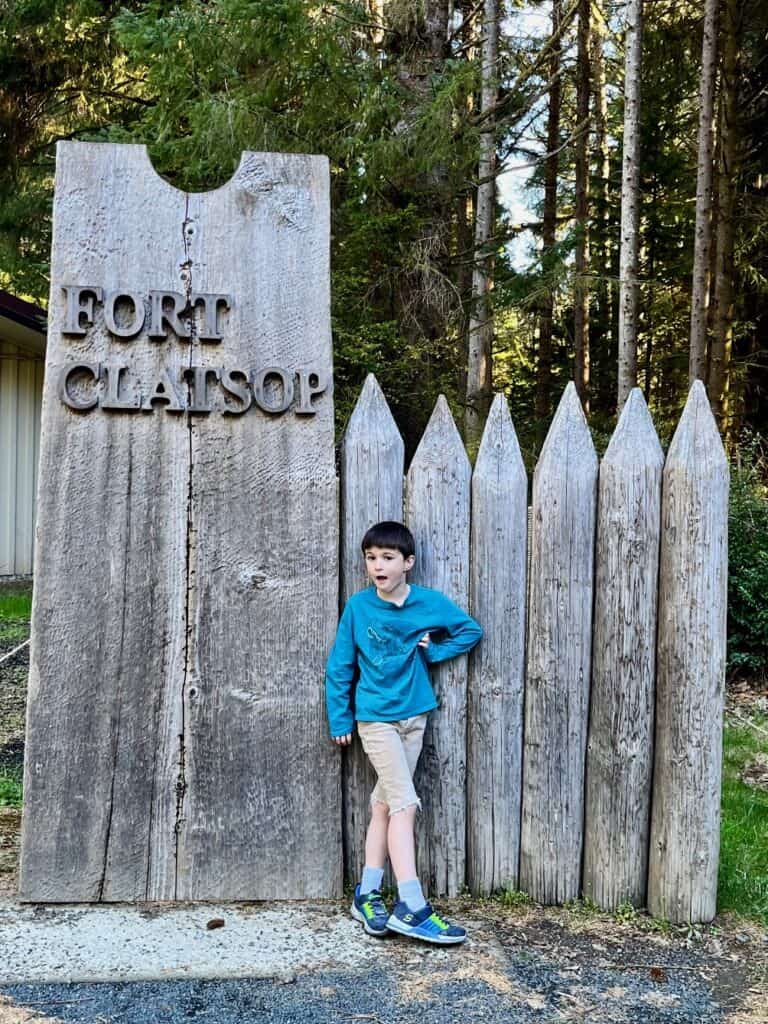
The Dismal Nitch and Middle Village sites are on the Washington side of the Columbia River (both about a 20-minute drive from Lewis and Clark NHP).
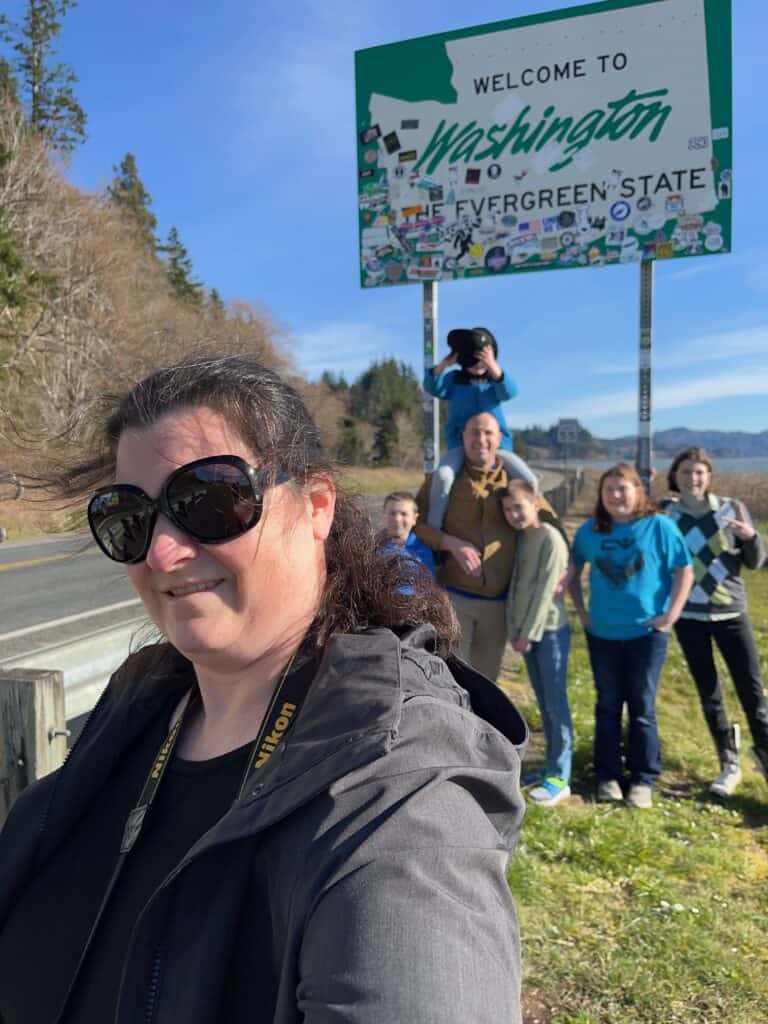
The historic significance of Fort Clatsop
The Corps of Discovery made United States history when they mapped routes of travel from the Mississippi River to the Pacific Ocean.
Meriwether Lewis and William Clark led the two-year expedition, accompanied by Sacagawea and other party members. This journey was no easy feat, and the Corps faced many challenges along the way. At the request of President Thomas Jefferson, the expedition members began in St. Louis and mapped the journey to the Pacific Coast and back.
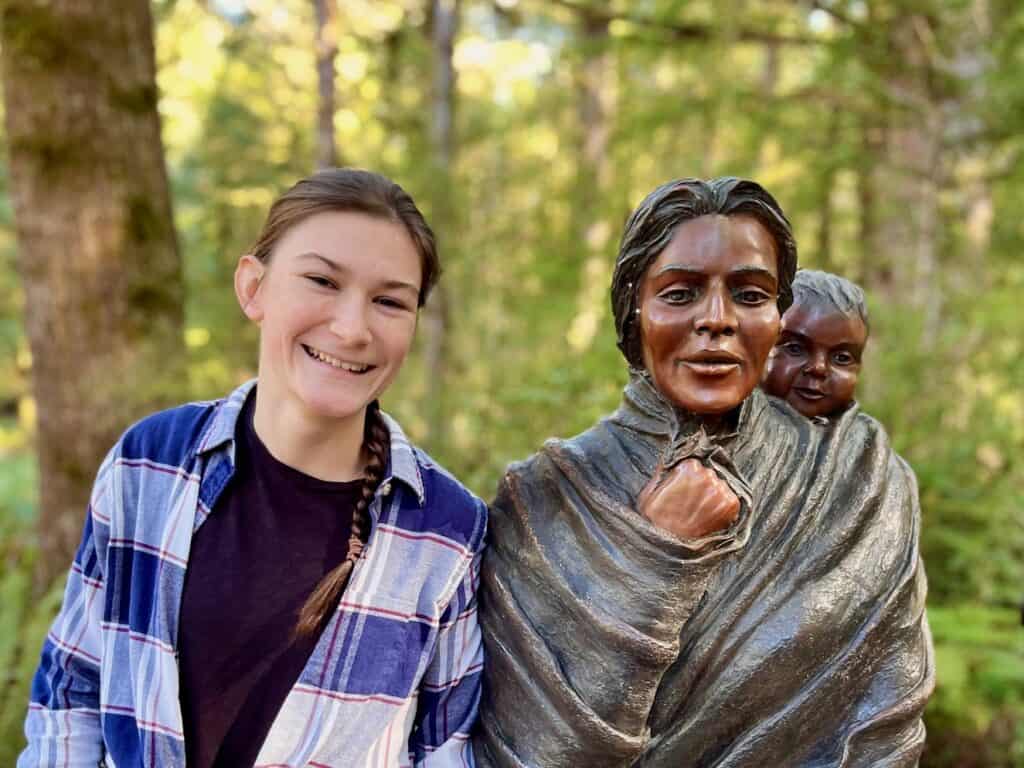
The Lewis and Clark National Historic Trail is a collection of national parks, state parks, and historic sites which follow the footsteps of the explorers from Pennsylvania to the Pacific (as well as other significant events in their lives). Fort Clatsop was the site of the explorers’ winter encampment.
What to see at Fort Clatsop National Park
Visitor Center
The Fort Clatsop unit of the Lewis and Clark NHP has several notable features. The Fort Clatsop Visitor Center offers ranger-led programs, as well as audio-visual presentations. We started with the introductory movie in the theater that explains the history and significance of Fort Clatsop to the Corps of Discovery through the eyes of the indigenous Clatsop people.
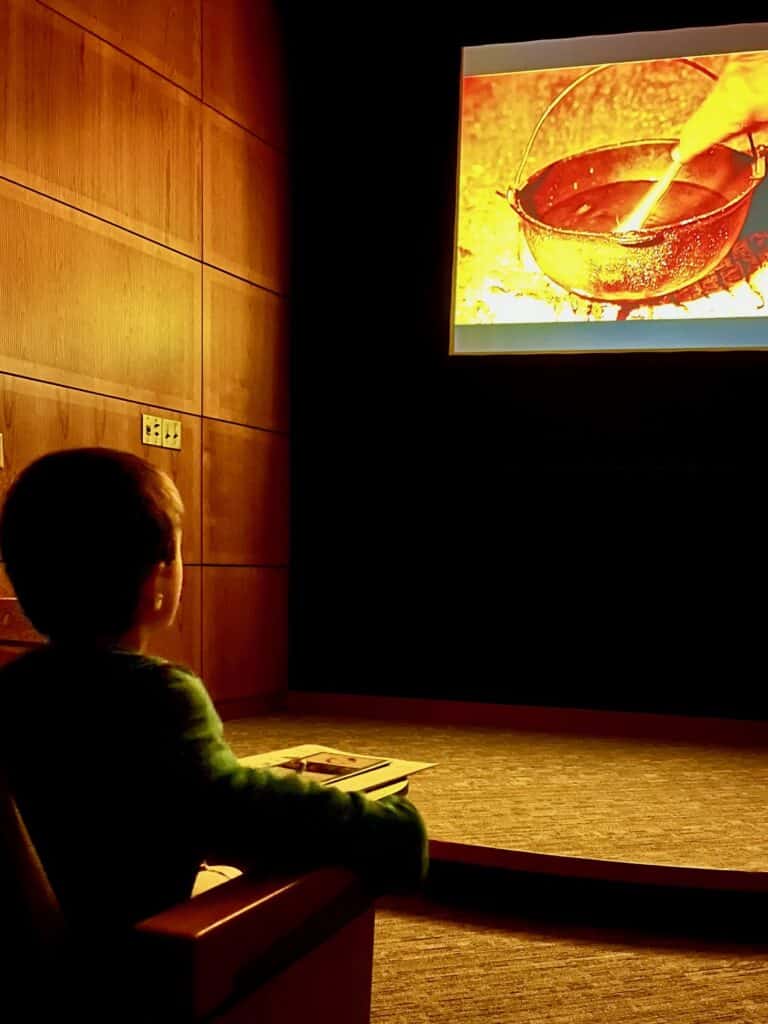
Our kids loved exploring the exhibit hall which includes artifacts from the expedition and interpretive activities. One display allows you to flip through pressed plants that grow in the area, while another display offers models of animal footprints to trace and identify.
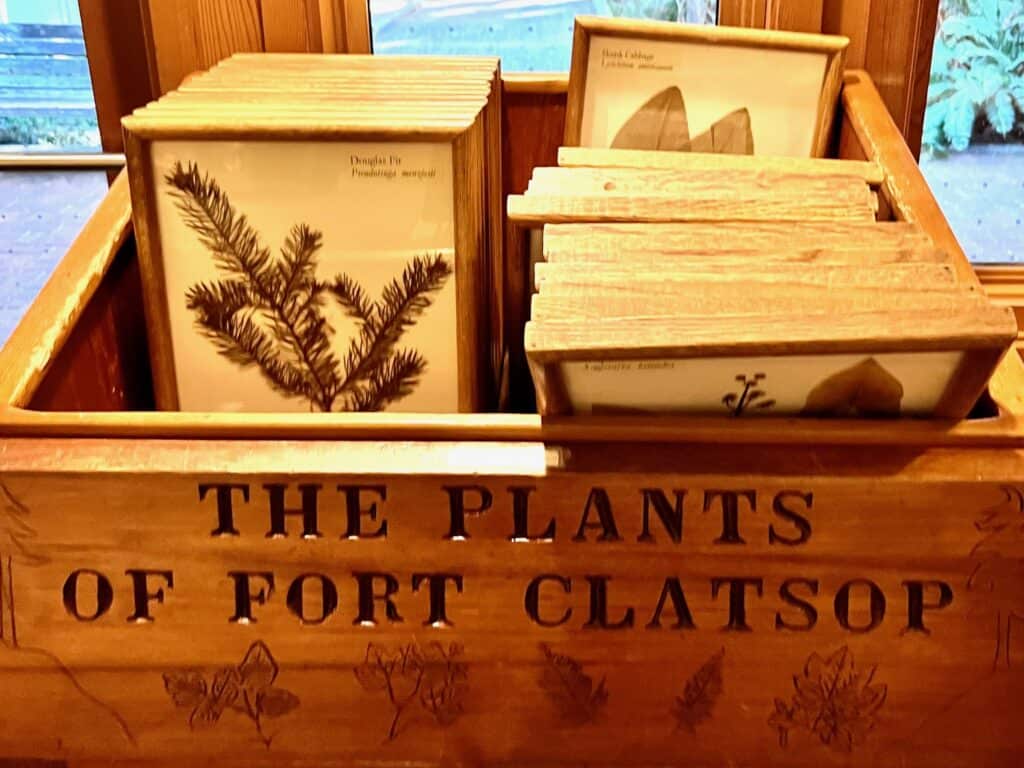
Our boys particularly enjoyed watching a short film that showed how to load and fire a musket. Seeing that process really made it clear how difficult hunting could be in the early 1800s.
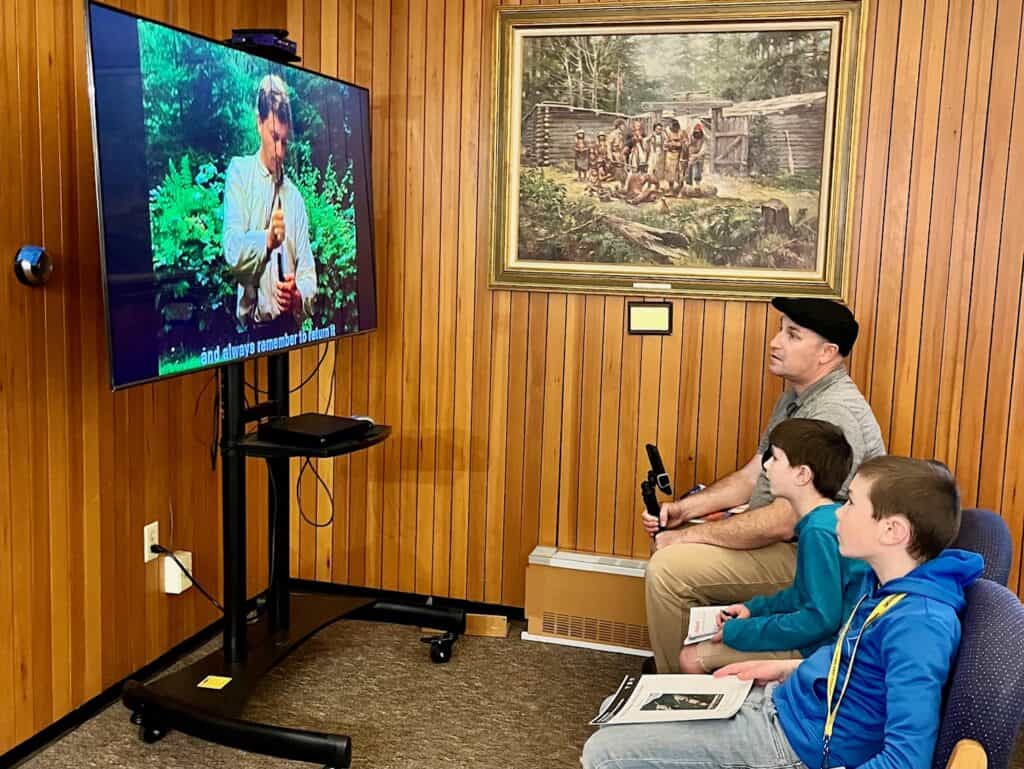
Junior Ranger program
We recommend stopping at the Fort Clatsop Visitor Center first if you plan to visit several of the local Lewis and Clark sites. Not only is it the best place to get visitor information, but you can also pick up Junior Ranger booklets for your kids.
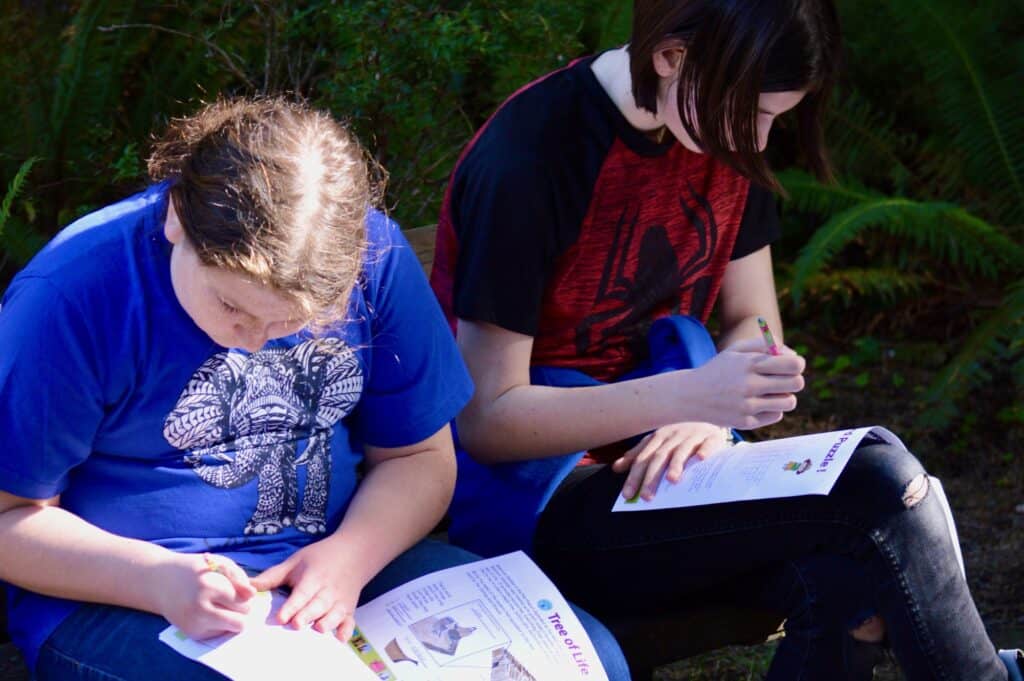
To earn the Junior Ranger badge for this park, you will need to visit several of the other sites and units nearby. The number of sites and activities your child needs to complete is based on their age.
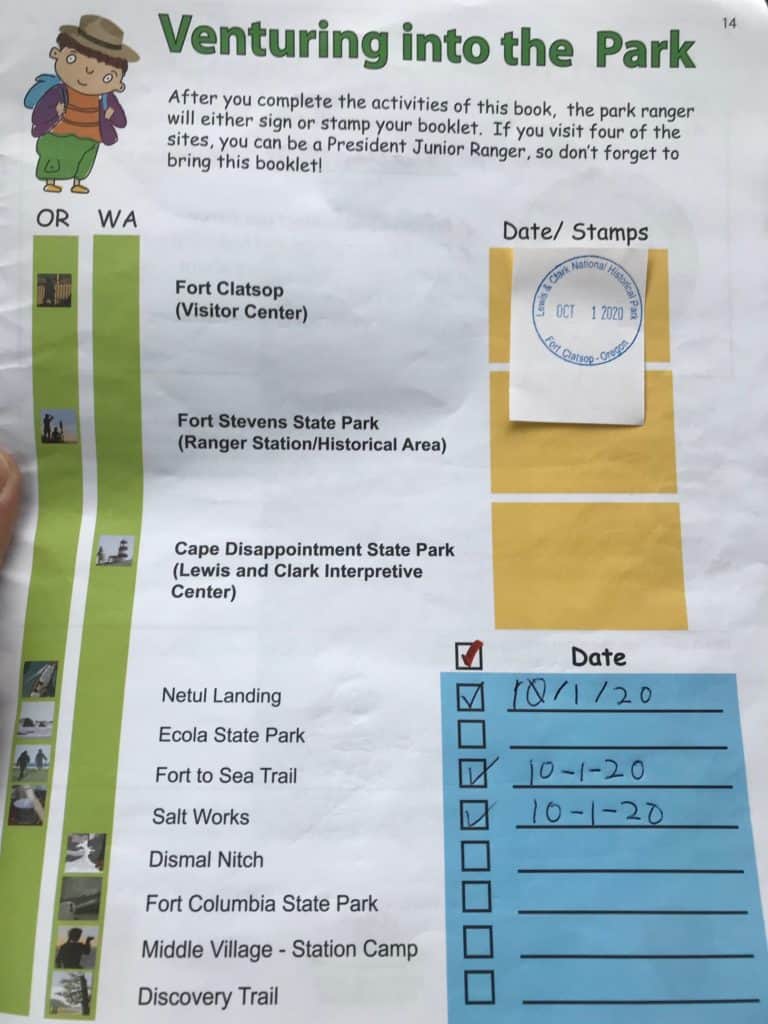
The Fort Clatsop Visitor Center has National Parks and Junior Ranger stamps for several of these other nearby units. It’s a great spot to start AND finish your tour of the Lewis and Clark National Historical Park.
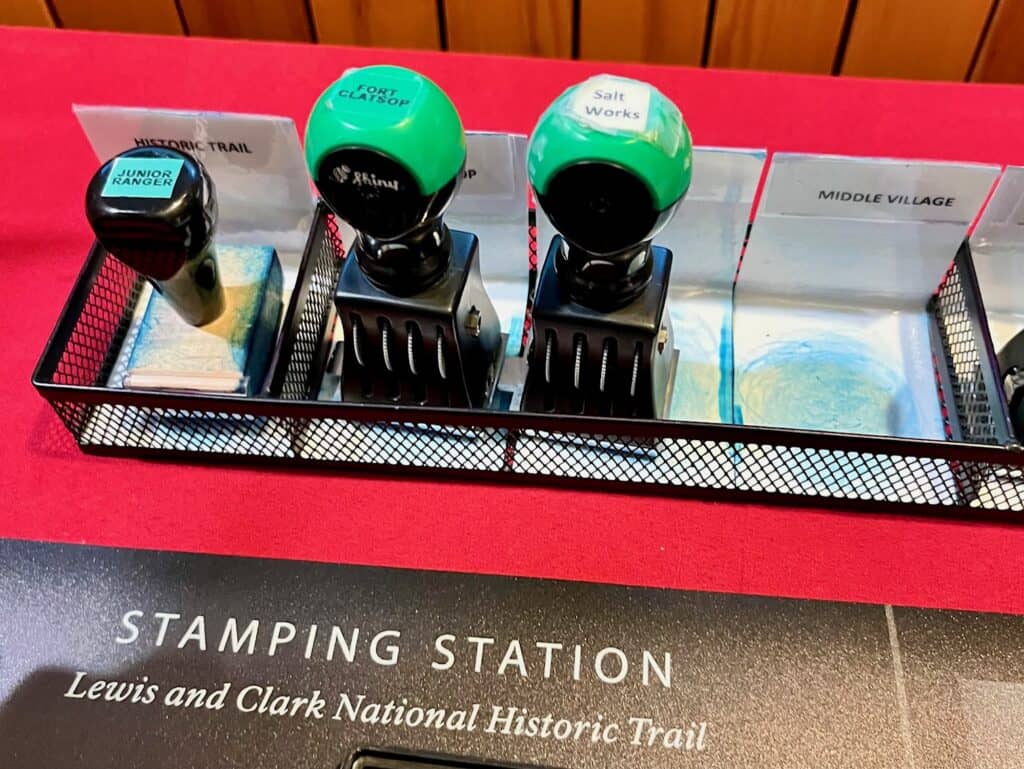
The gift shop offers a variety of items, including books, maps, and souvenirs. The selection is great, and both kids and adults will easily find something to interest them, so definitely plan to spend a bit of time exploring!
Fort Clatsop Replica
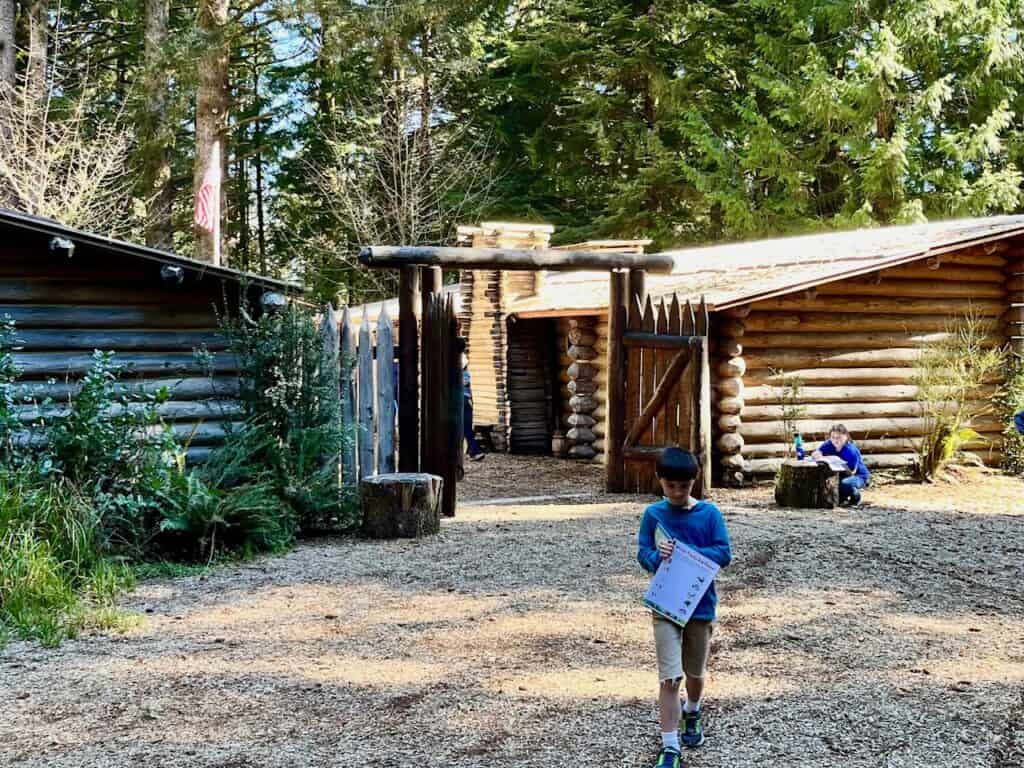
It’s a short walk from the Visitor Center to the focus of the park, the full-scale replica of Fort Clatsop. Along the way, your kids can look for native plants of the coastal forests to check off in their Junior Ranger book.
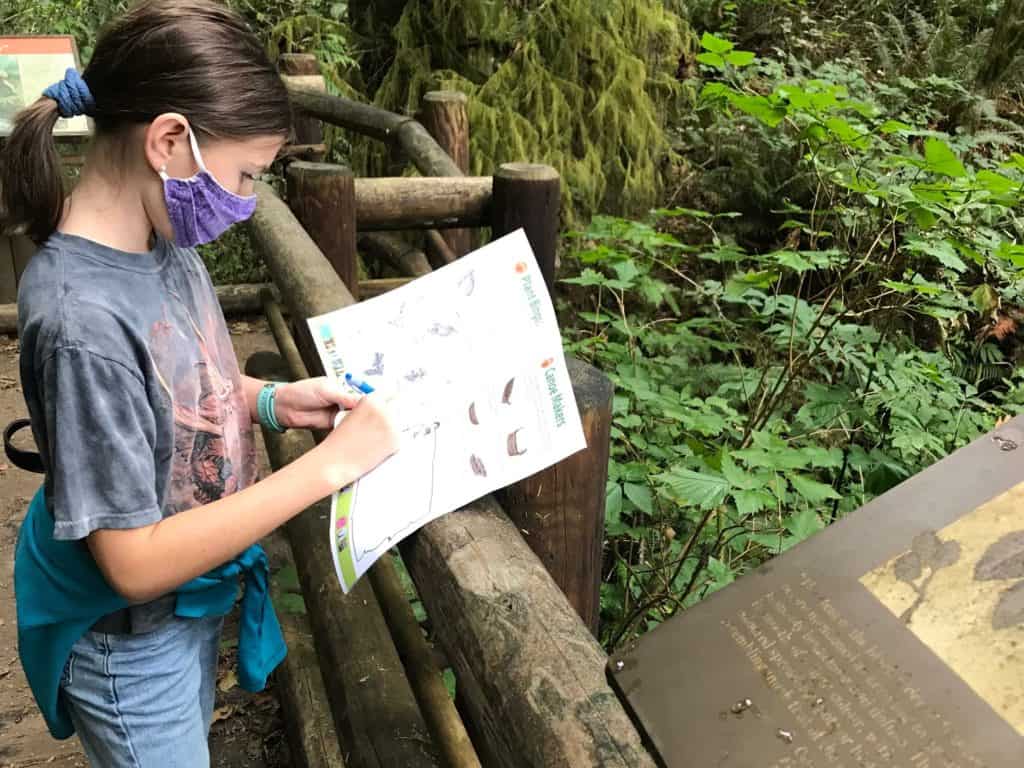
As you walk in through the palisades you’ll see inside the reconstruction of the fort. Park rangers give interpretive talks and demonstrations, which often involve volunteers in historic costumes during special events. Note: we’ve seen more demonstrations when school groups are present.
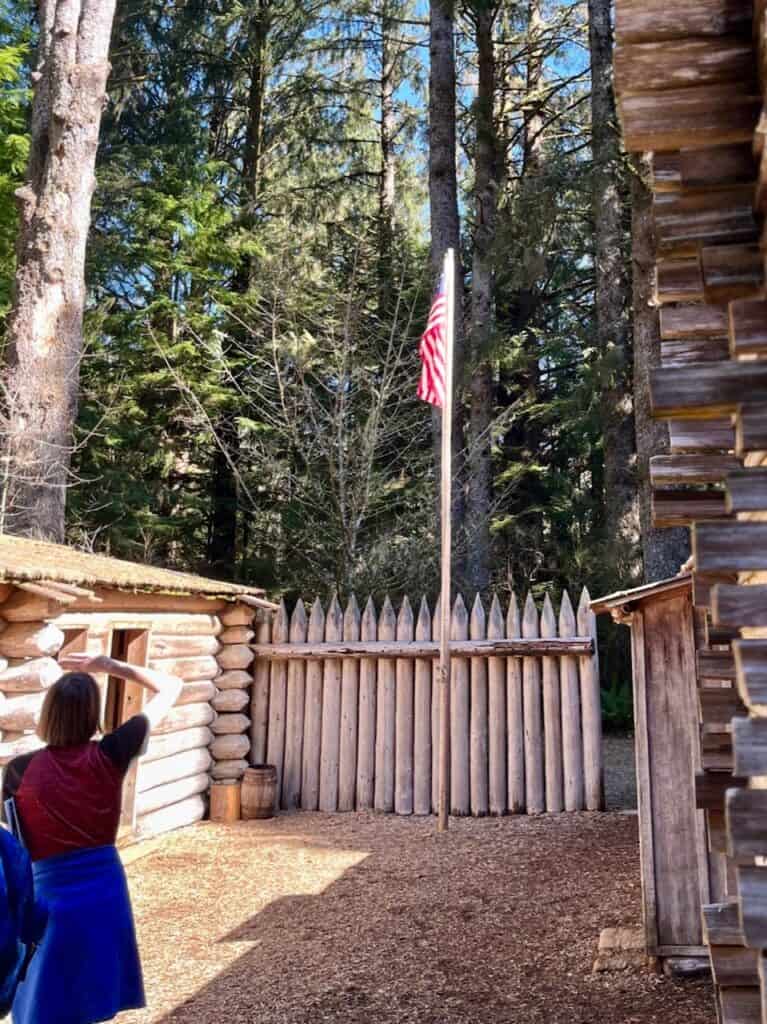
We felt sorry for the 33 members of the Lewis and Clark Expedition when we saw how small the fort was. We’ve visited the Oregon Coast several times during the rainy winter season, and couldn’t imagine that many people being stuck in those buildings together all that time!
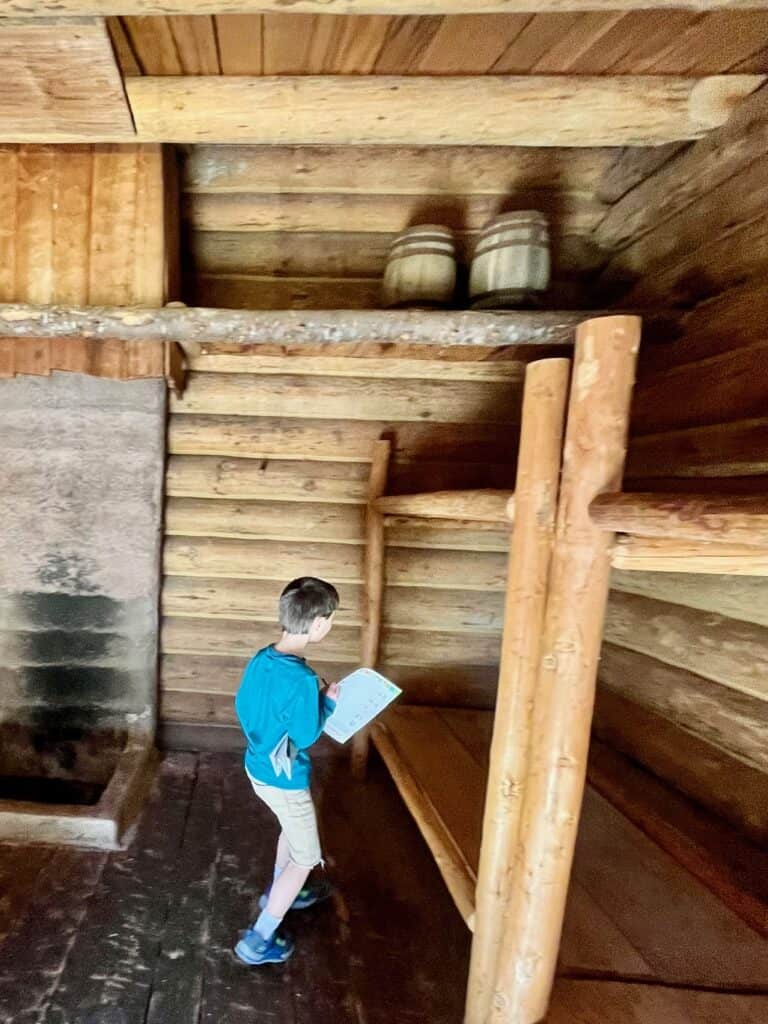
Netul River Trail
From the fort replica, you can walk through the forest down to the Netul River Trail. It’s a little over a mile to the Netul Landing Site picnic area along the river path. Our kids enjoyed the walk even on a damp day.
@dinkumtribe Fort Clatsop is one of our favorite places to visit on the Lewis and Clark Trail of National Historic sites. The walk from the reconstructed fort to the canoe landing on the Netul River is beautiful and showcases several different biomes along the way. #lewisandclark #traveltok #nationalhistoricsite #npsoftiktok #nationalparksusa #nationalparkservice #traveloregon #hikingwithkids @DinkumTribe ADHD family travel @DinkumTribe ADHD family travel @DinkumTribe ADHD family travel ♬ Acoustic Folk Instrumental – Yunusta
Alternatively, you can drive directly to the Netul Landing site from the Visitor’s Center— the parking lot is right off Fort Clatsop Road. The fee is included with your park entrance fee.
The Netul Landing site includes a small parking lot, picnic tables, and a short trail that leads down to the river. A covered interpretive pavilion explains the significance of the site.
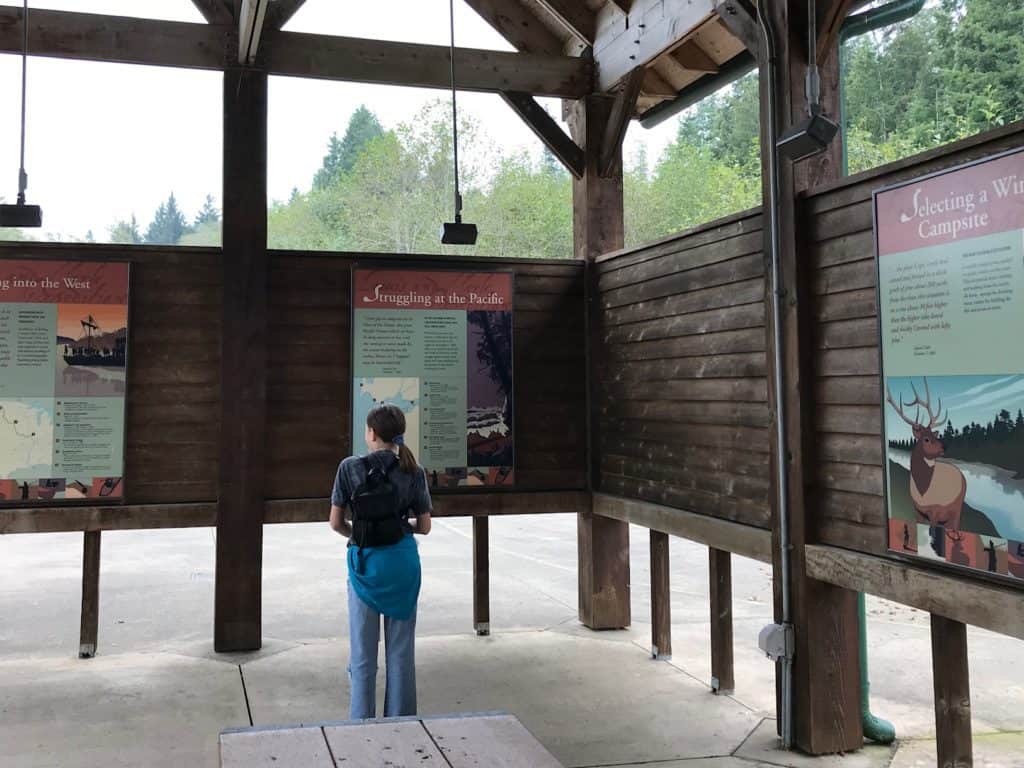
Note that there are two parking areas that also have picnic areas at the Netul Landing site. If you’re driving from the Fort, the first parking area has the covered interpretive pavilion. From there you can walk along the river path to another parking area with a picnic pavilion and the canoe replicas.
Kayaking and Hiking (Fort to Sea)
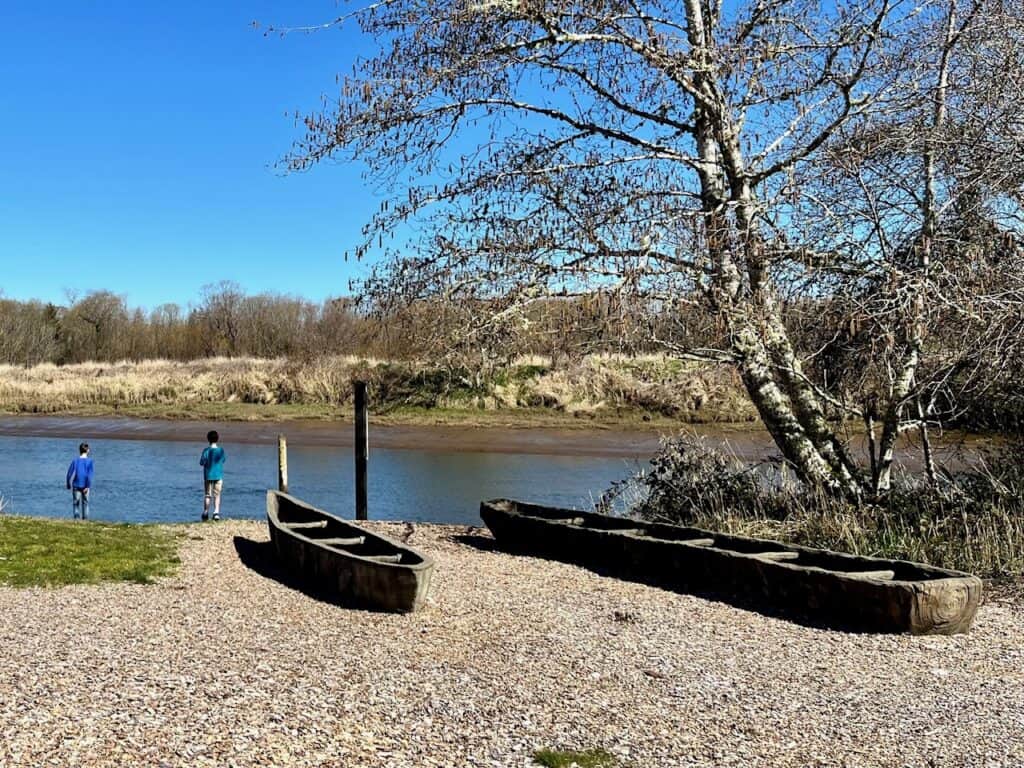
A canoe and kayak launch on the riverbank commemorates the Corps of Discovery’s historic canoe landing in early December 1805. Launch your kayak or canoe from here, or enjoy a ranger-led kayak tour in the summertime.
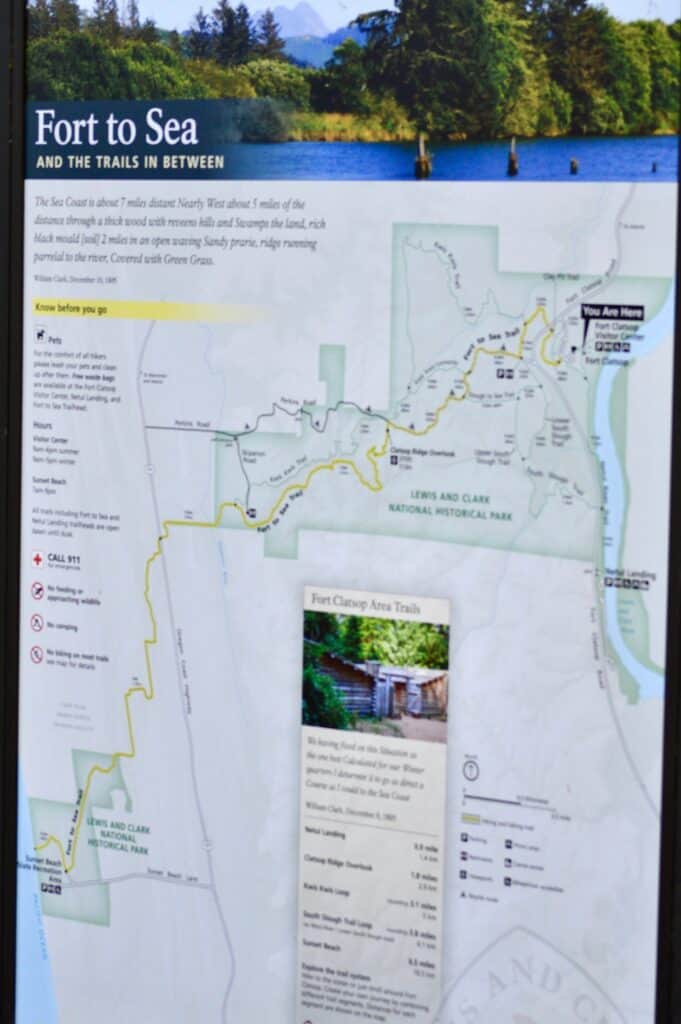
The Fort to Sea trail follows the path the Expedition took from Fort Clatsop to Sunset Beach. It’s over 6 miles one way, with varying terrain and few amenities along the way. If you have seasoned hikers in your family, it would make a great day hike.
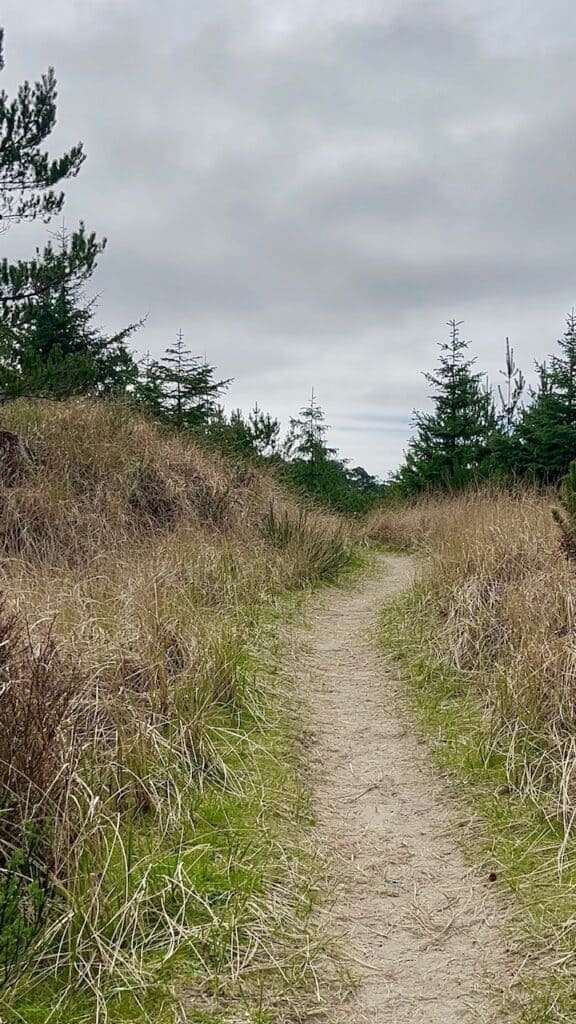
Nearby Natural Features
The mouth of the Columbia River is located just downstream from the Netul Landing Site. This area is home to a variety of wetlands and is a critical habitat for many species of birds. There are multiple habitats, including freshwater marshes, forested wetlands, and coastal estuaries.
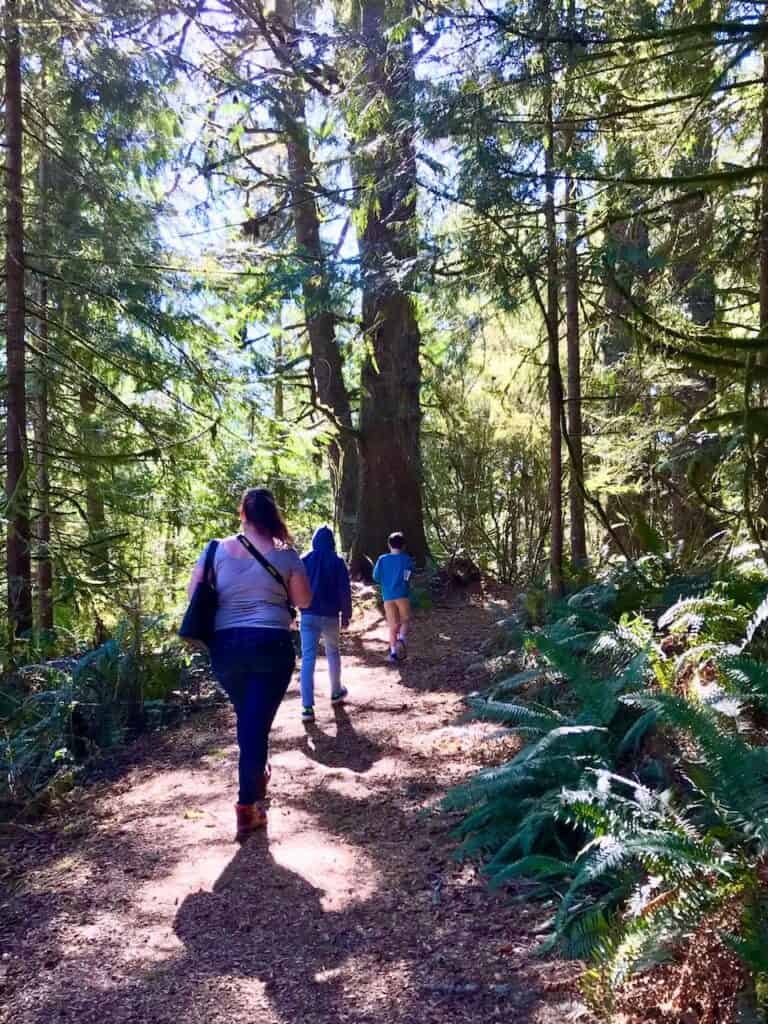
The Lewis and Clark National Historical Park is open year-round. The best (and busiest) time to visit is during the summer months. However, you can still enjoy Fort Clatsop national park in the rainy fall, winter, or spring (that’s when our family has always visited).
Check the website for current park hours and upcoming events.
Other Lewis and Clark sites near Fort Clatsop National Park
Salt Works (Seaside)
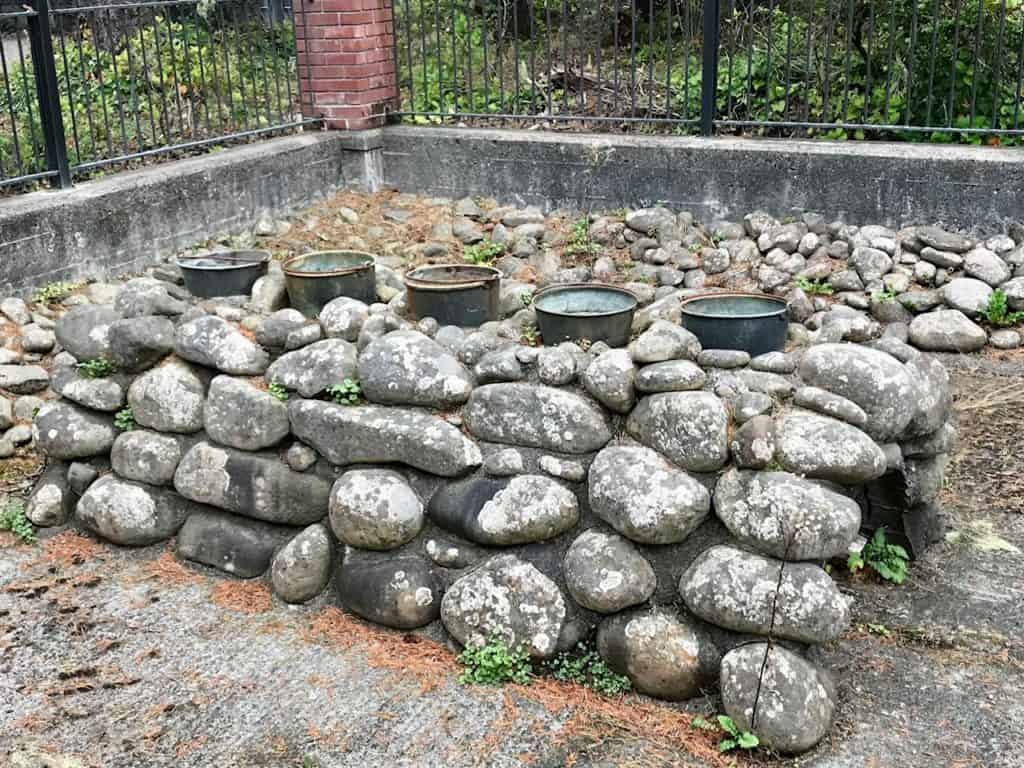
The Salt Works area of the Lewis and Clark National Historic Park is a great place to learn about the expedition’s work in creating salt. This was an important part of their food preservation for survival on later parts of the trip when they were unable to hunt or fish.
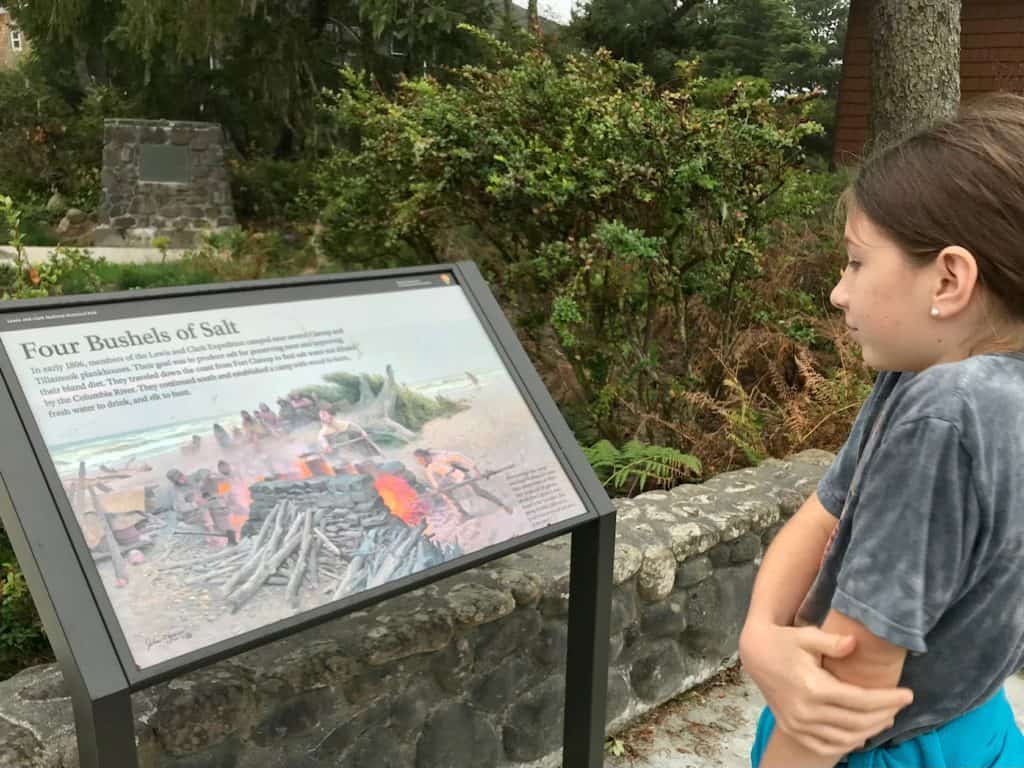
It’s in a small neighborhood in downtown Seaside, and there’s not much to see at the Salt Cairn (and no amenities whatsoever).
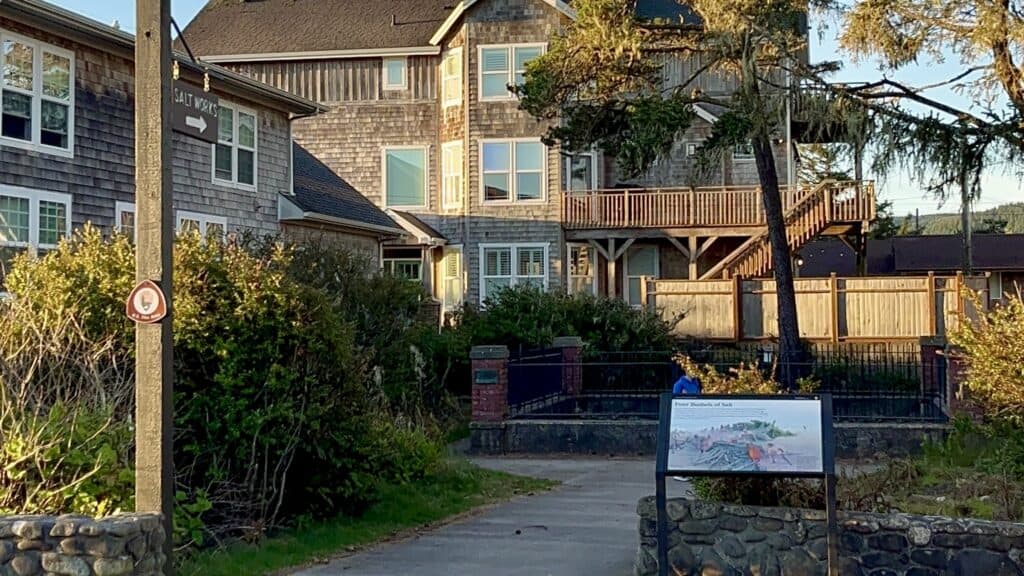
If you walk a few blocks over to the Seaside Promenade and follow it to the central roundabout, there’s a beautiful replica of the explorers catching their first view of the Pacific.
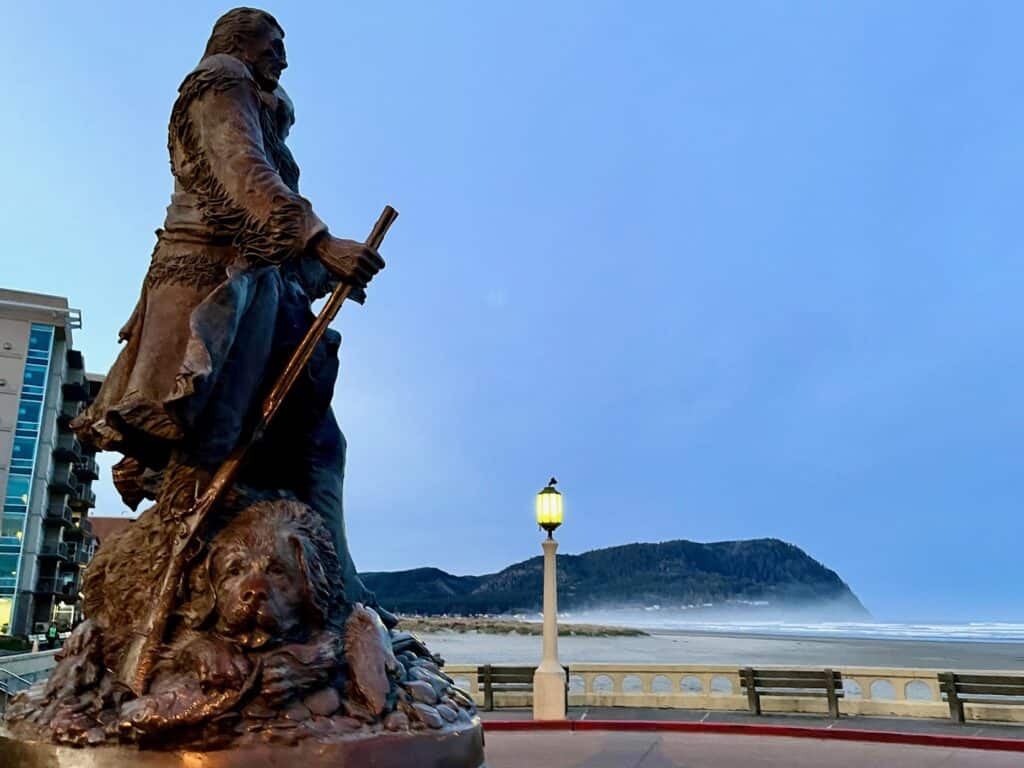
Seaside’s many other nearby attractions make it a worthwhile stop. Seaside also features a local history museum that is part of the Lewis & Clark Trail.
Ecola State Park
Continue your drive south (towards Cannon Beach) to check out the beautiful views of Ecola State Park.
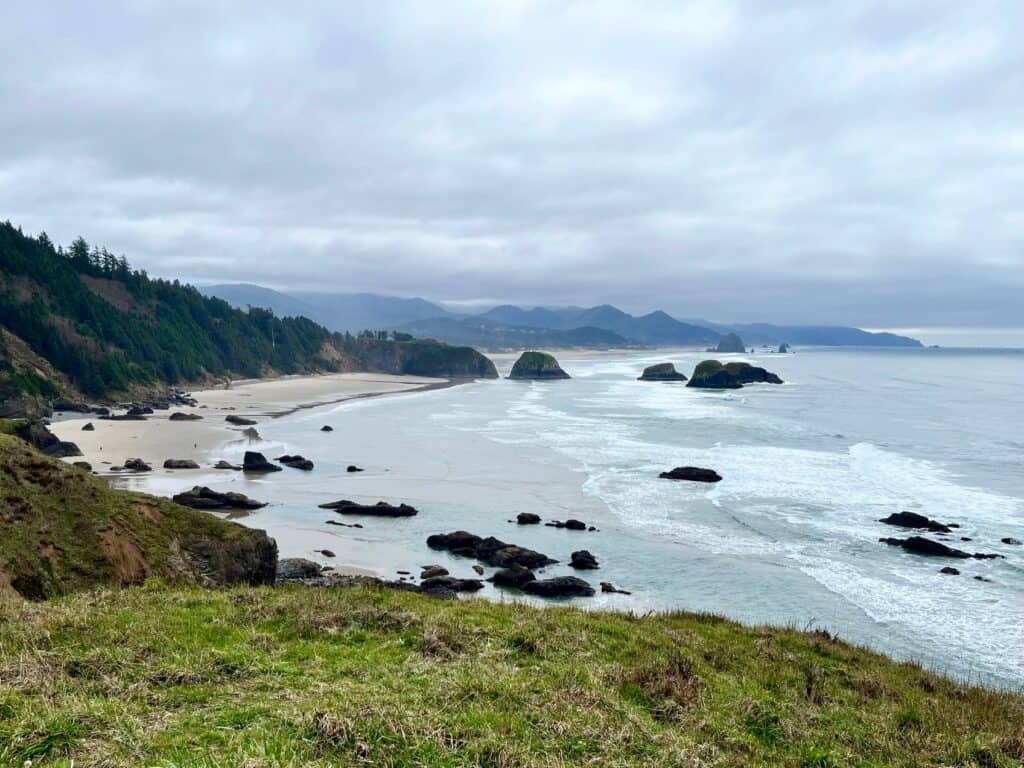
At Ecola, the Corps of Discovery found a whale corpse that provided them with much-needed food and blubber (used for oil).
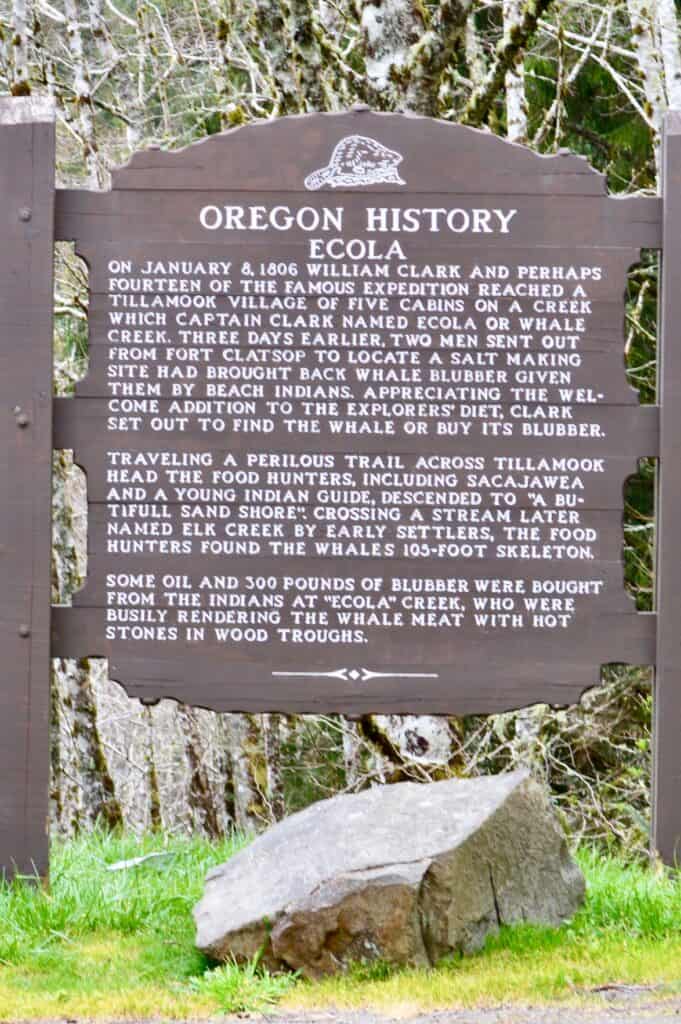
Today you can often see whales from the high cliff top or have a picnic lunch.
@dinkumtribe We’ve been visiting Ecola State Park for over 20 years, and while the trails and facilities have changed over the years, the views are still incredible! If you visit, be sure to pay attention to the trail signs and “off-limits” areas- there is significant erosion and trail damage happening, so cliffs may not be as stable as they look. #traveloregon #familytravel #oregonstateparks #leavenothingbutfootprints #oregoncoast #traveltok @DinkumTribe ADHD family travel @DinkumTribe ADHD family travel @DinkumTribe ADHD family travel ♬ Countryside – Andrew Joy
Units north of Fort Clatsop (Washington)
If you drive north from Fort Clatsop, you’ll cross the Columbia River estuary into Astoria. Take the Astoria-Megler bridge across the state line into Washington to visit other sites connected to the Corps of Discovery.
@dinkumtribe Crossing the Astoria-Megler Bridge is always fun, but especially when it’s such a gorgeous day! @DinkumTribe ADHD family travel @DinkumTribe ADHD family travel @DinkumTribe ADHD family travel #astoriaoregon #astoriabridge #oregoncoast #columbiariver #traveloregon #oregontravelguide ♬ original sound – DinkumTribe ADHD family travel
A short drive away is two smaller historic sites, Dismal Nitch and Middle Village.
Dismal Nitch (WA)
Dismal Nitch tells the story of a challenging incident on the Lewis and Clark Expedition. It’s right next to a Washington State rest stop on the highway, which provides restrooms and picnic tables for vistors.
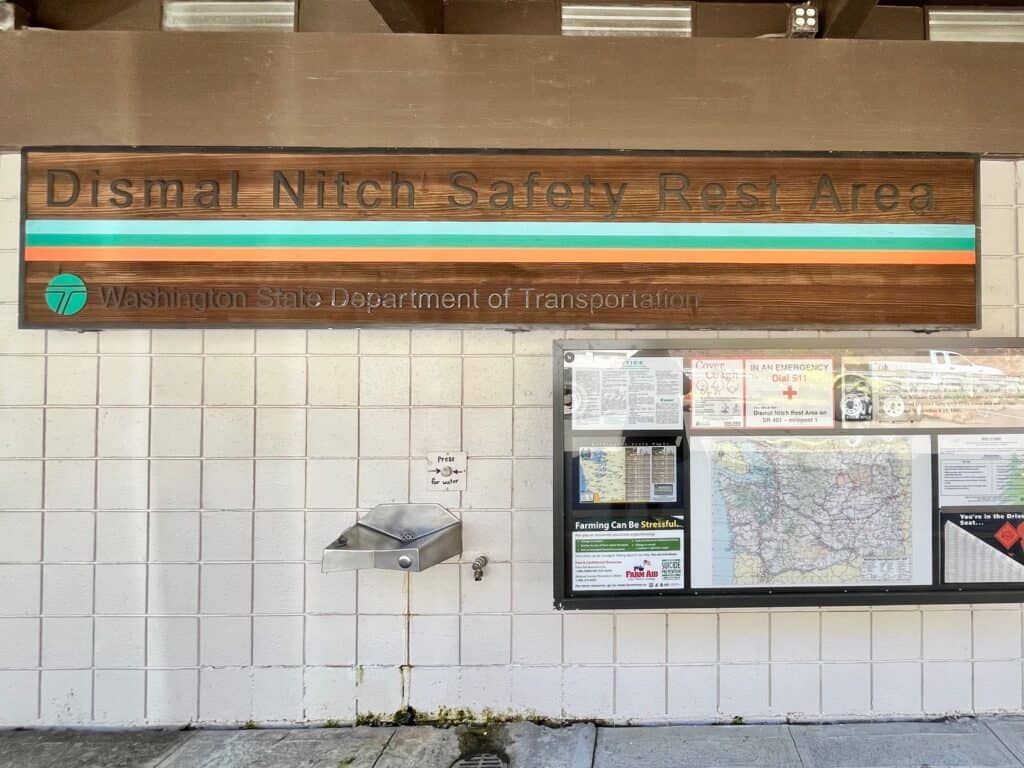
This is a perfect spot to get some beautiful views of the Columbia River, if you can manage the wind!
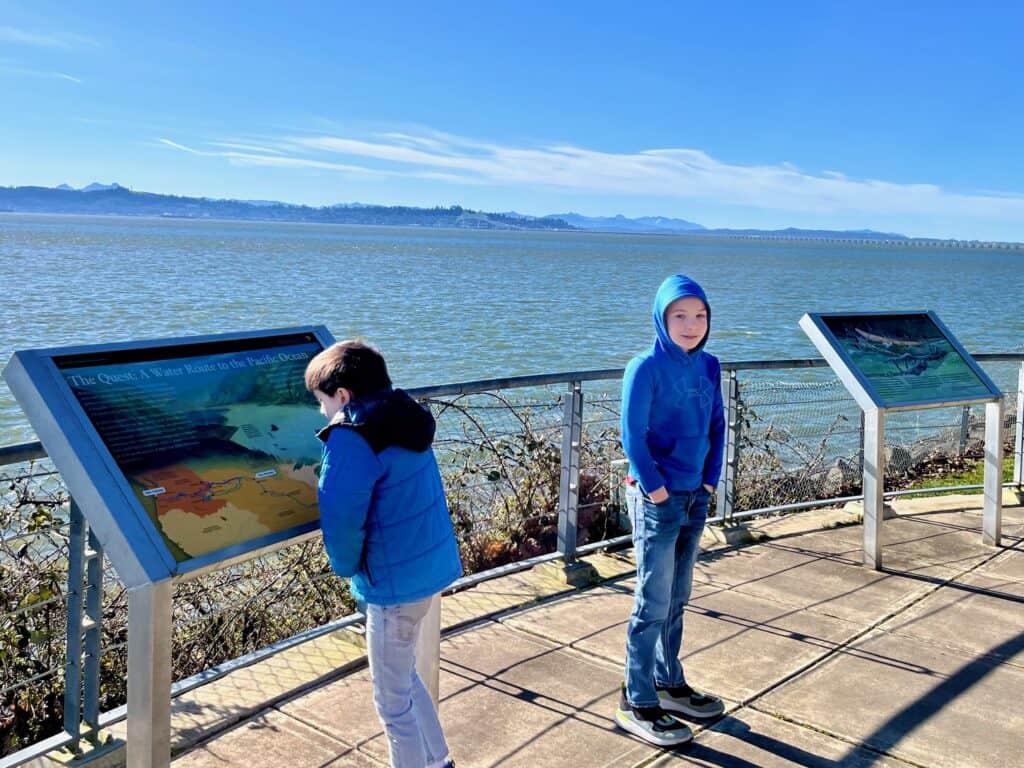
The interpretive signs and short trail explain how the Corps of Discovery found themselves trapped near the coast in the midst of a sudden winter storm. For six days they shivered through the rain and wind, and were shocked (and saved from starving) when a local Native tribe arrived in boats with fish to sell.
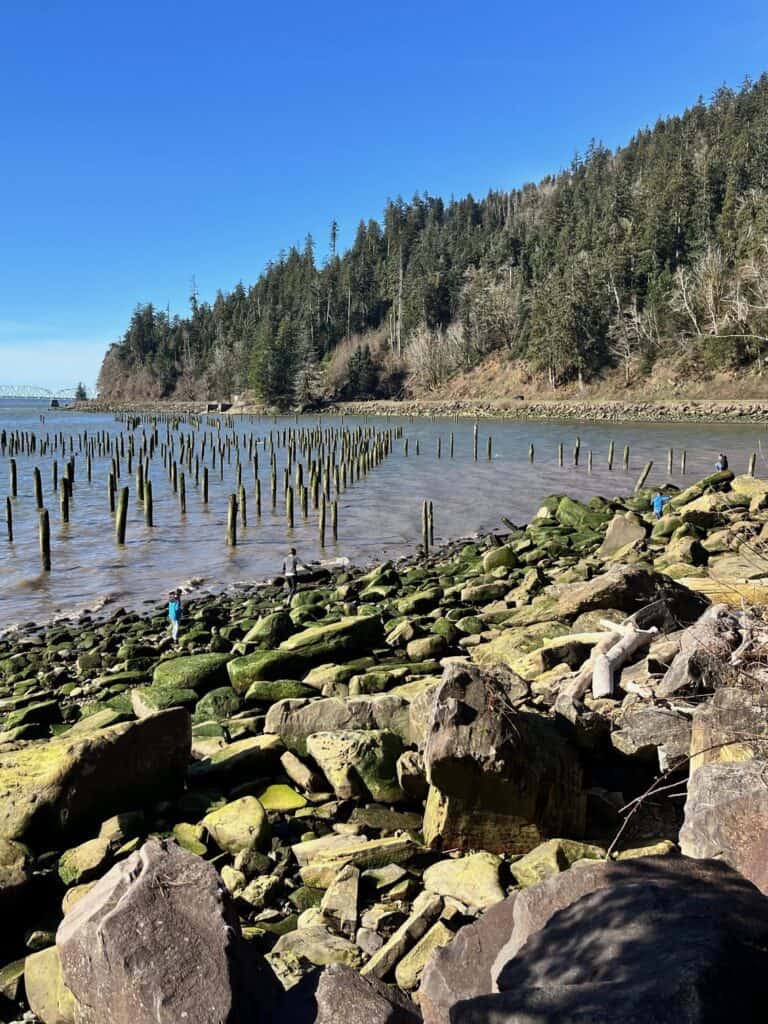
This is a great spot to let kids clamber over rocks and explore safely if the weather is nice. We were impressed with the beautiful bronze sculpture at the trails’ end as well.
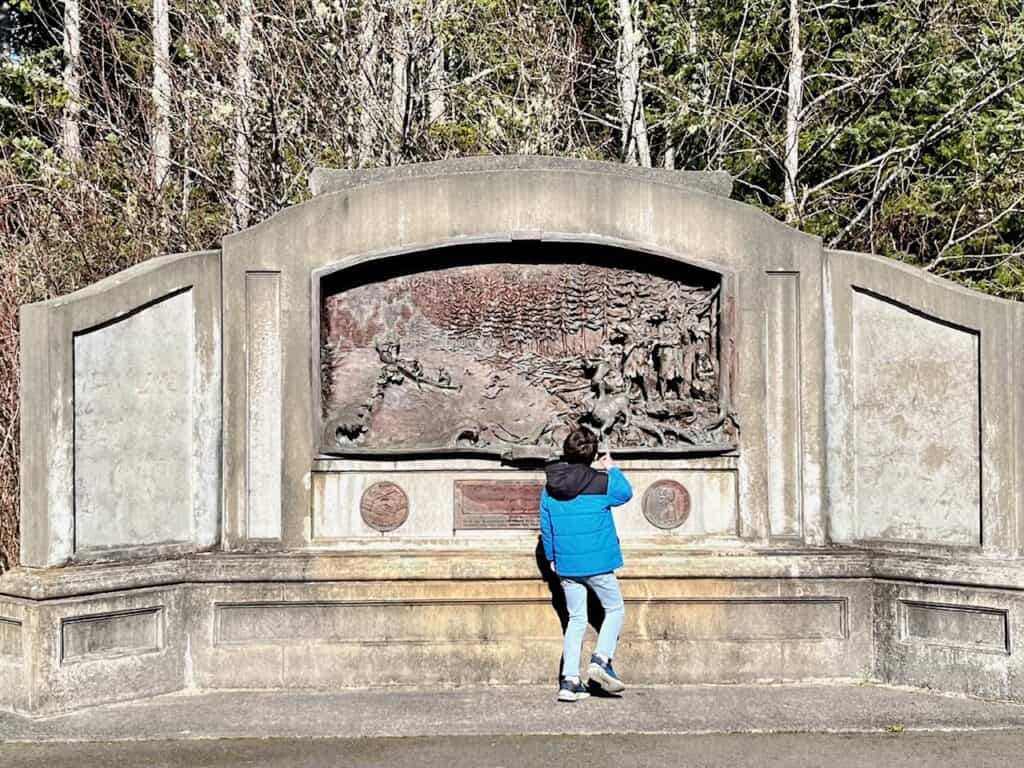
Middle Village / Station Camp (WA)
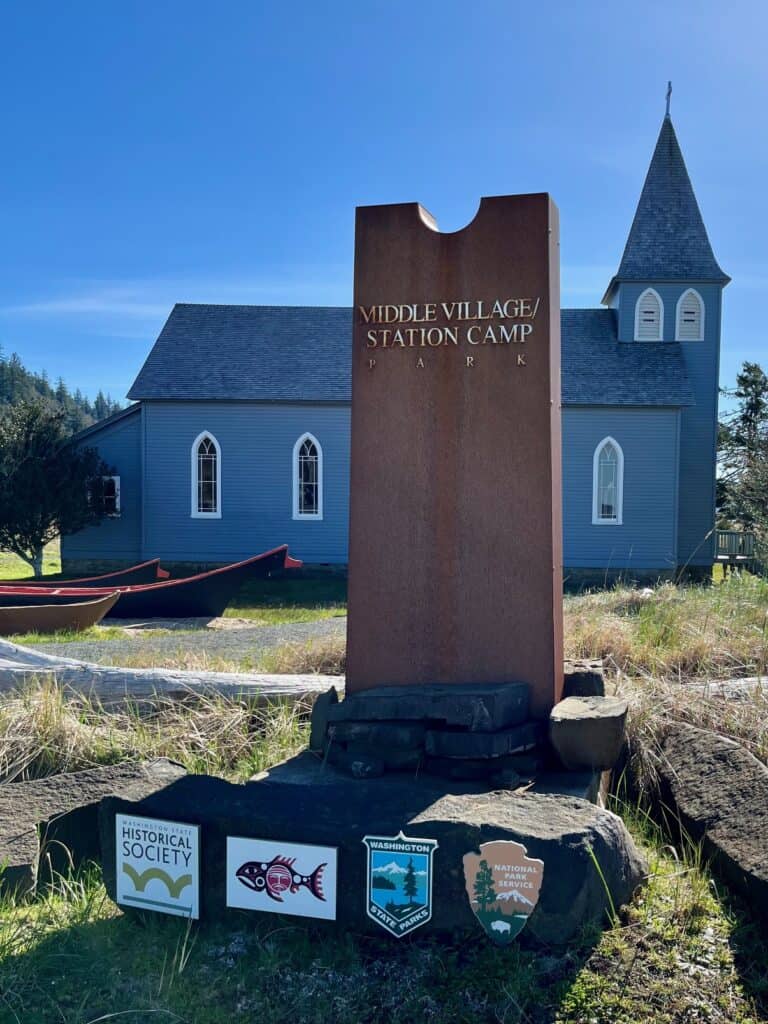
Middle Village (previously known to historians as Station Camp) contains rich archaeological evidence of a Chinook village. The same spot was later used as a campsite for the Lewis and Clark Expedition after the Chinook had moved to a different location.
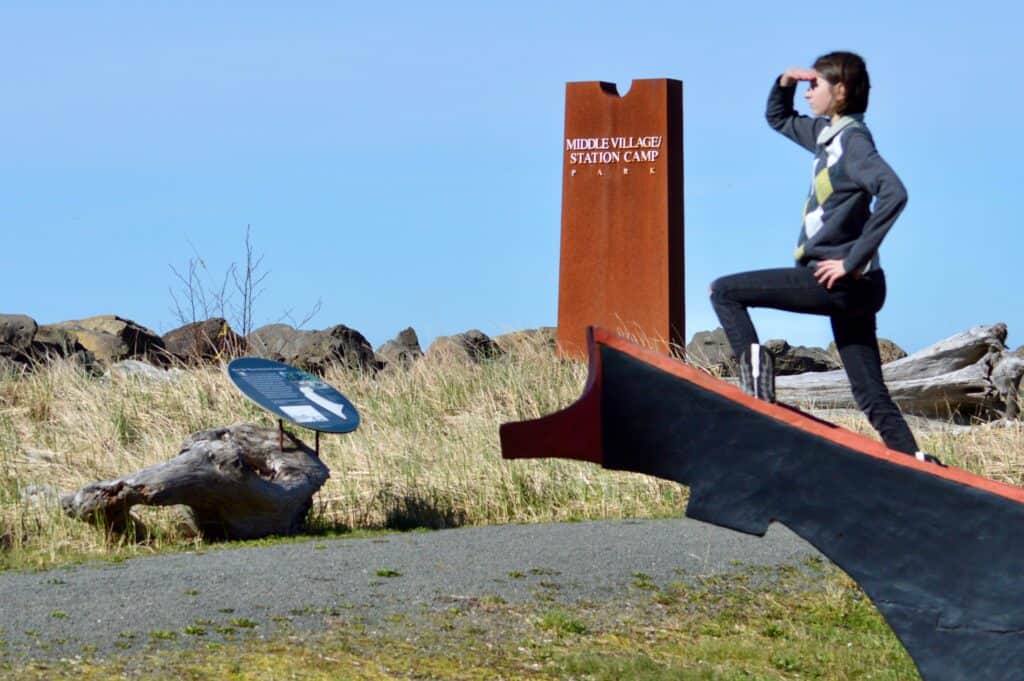
The Middle Village Park has an interpretive walk with signs and some interactive activities at each stop. It tells the story of the Native Chinook who lived at Middle Village, and also about their interactions with the Lewis and Clark Expedition.
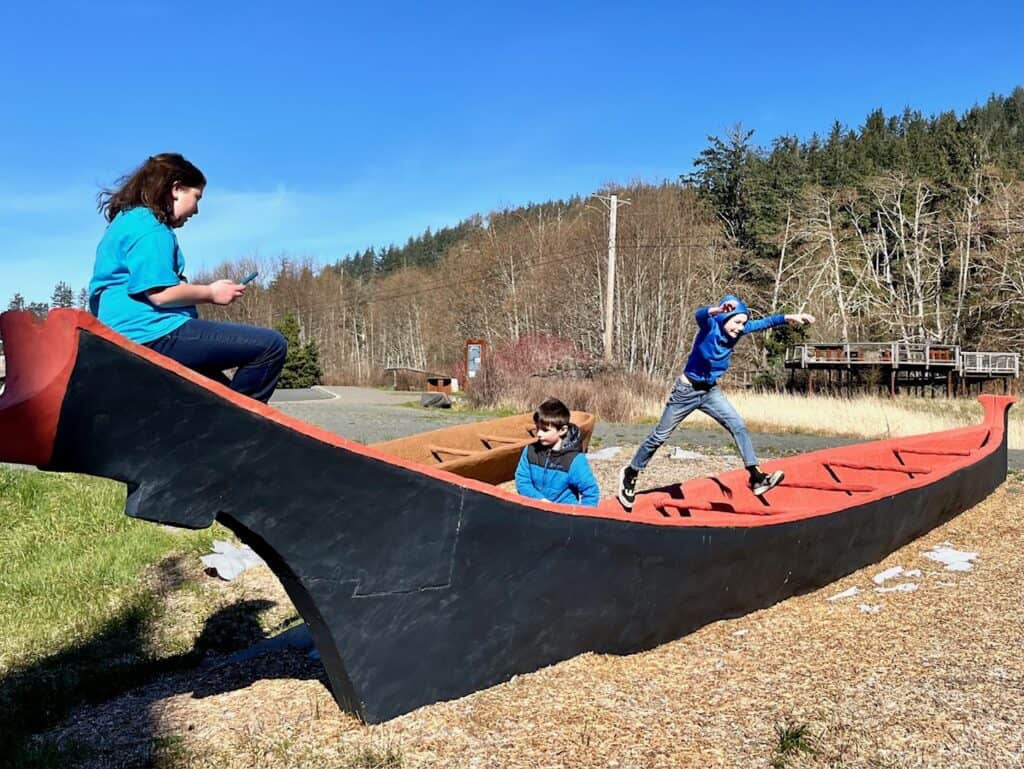
Our kids loved climbing over the replica canoes and pretending to be pirates or adventurers. At another spot, there are viewfinders to help you identify the various land features that are visible across the Columbia River.
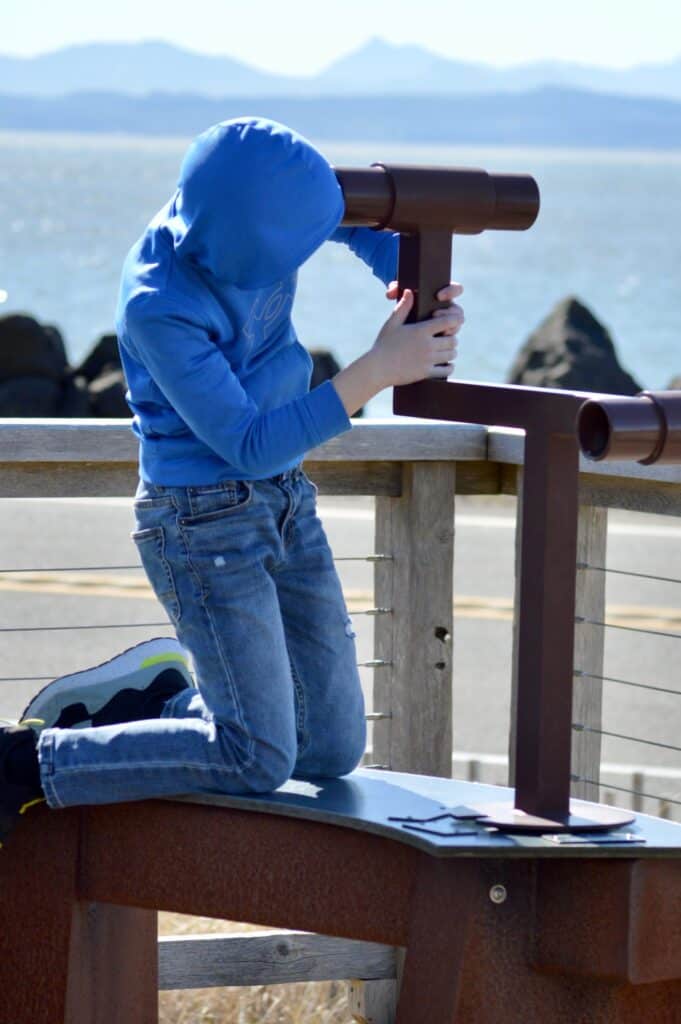
There’s a beautifully preserved historic church near the canoes as well, from some of the area’s early settlers. We spent about an hour exploring the site with our children, but moved on quickly because there are no amenities available.
Cape Disappointment State Park (WA)
Cape Disappointment State Park (formerly called Fort Canby State Park) is about 30 minutes from Astoria in Washington. Lewis and Clark’s expedition arrived in the area in November 1805. The Lewis and Clark Interpretive Center has even more exhibits to expand your learning about the Corps of Discovery.
A memorable experience
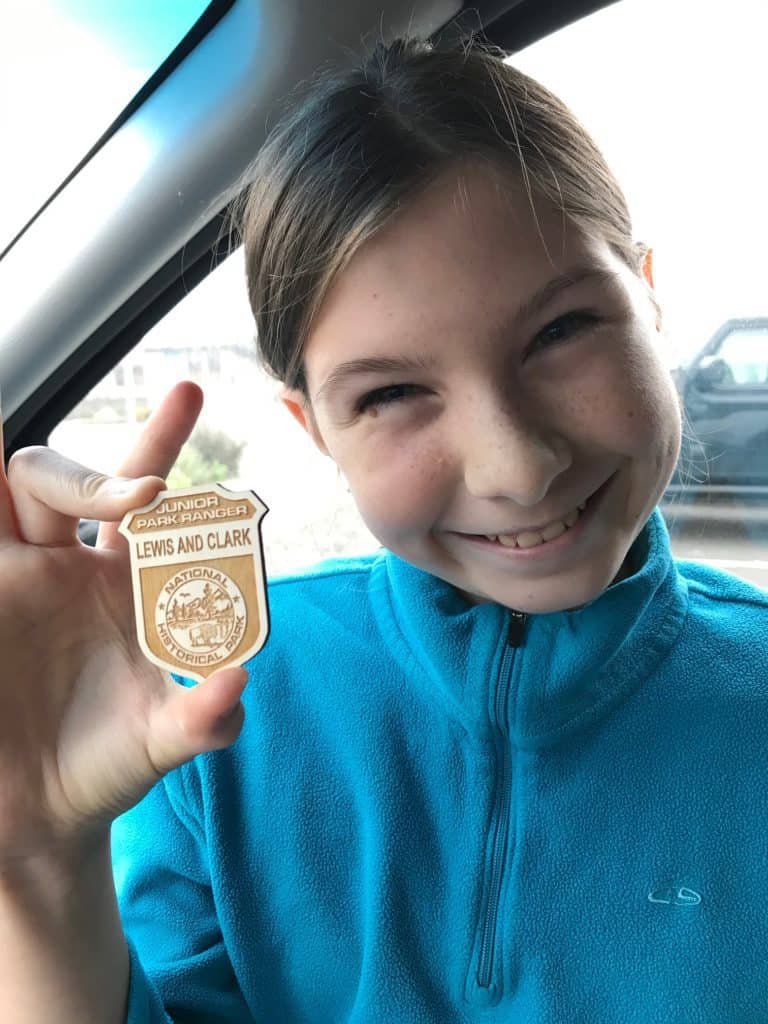
Fort Clatsop National Park and its other connected sites have so much to offer families! Earning the Junior Ranger badge was a highlight for my daughter when we visited Seaside on our mother-daughter trip.
The other kids got to earn their badges this time, which was especially fun since they saw the Westward Expansion Museum in St. Louis a few summers back. Gotta love connecting the dots as part of our homeschool history learning!
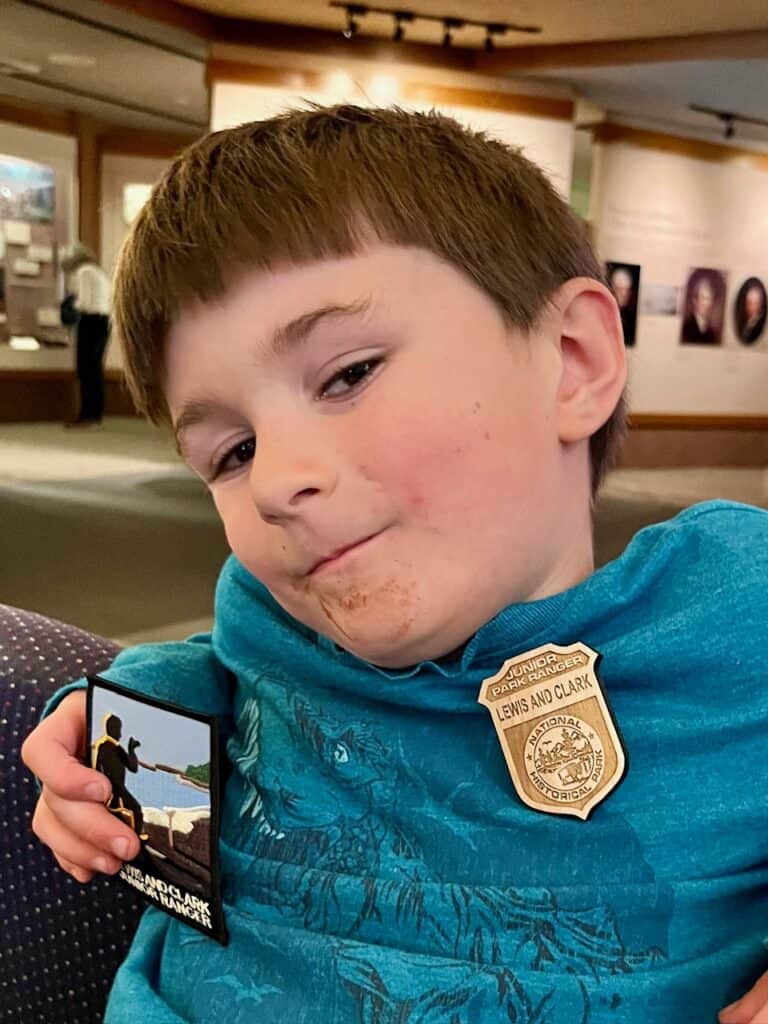
If you’re looking for a unique and educational experience, be sure to check out Fort Clatsop National Park. You won’t be disappointed!
© Copyright Jennifer D. Warren 2022. Updated and expanded: April 7, 2024.
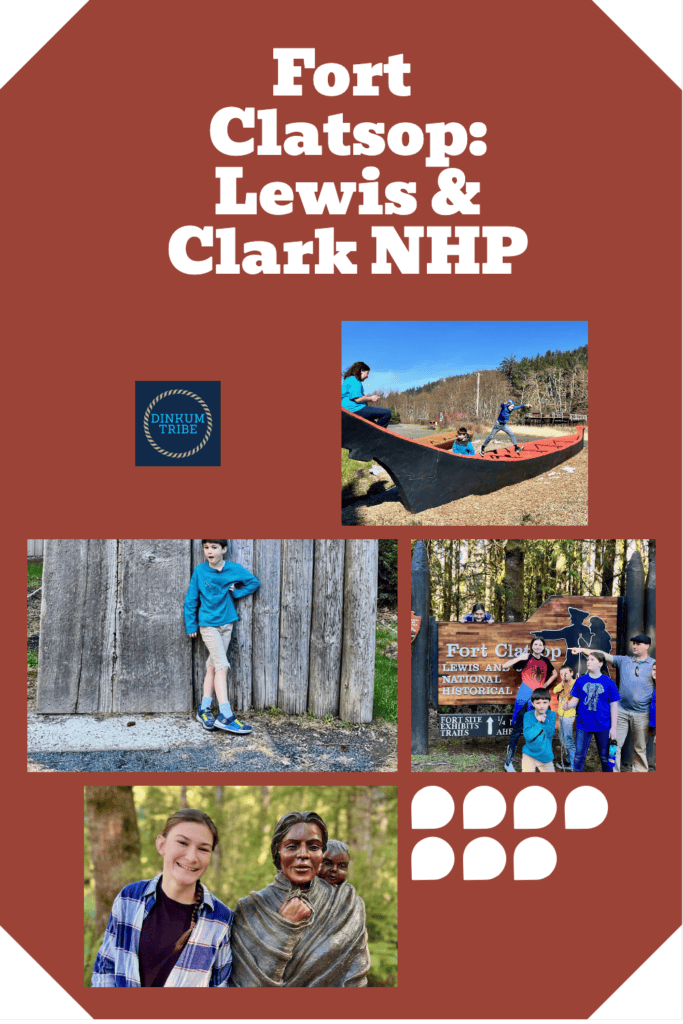
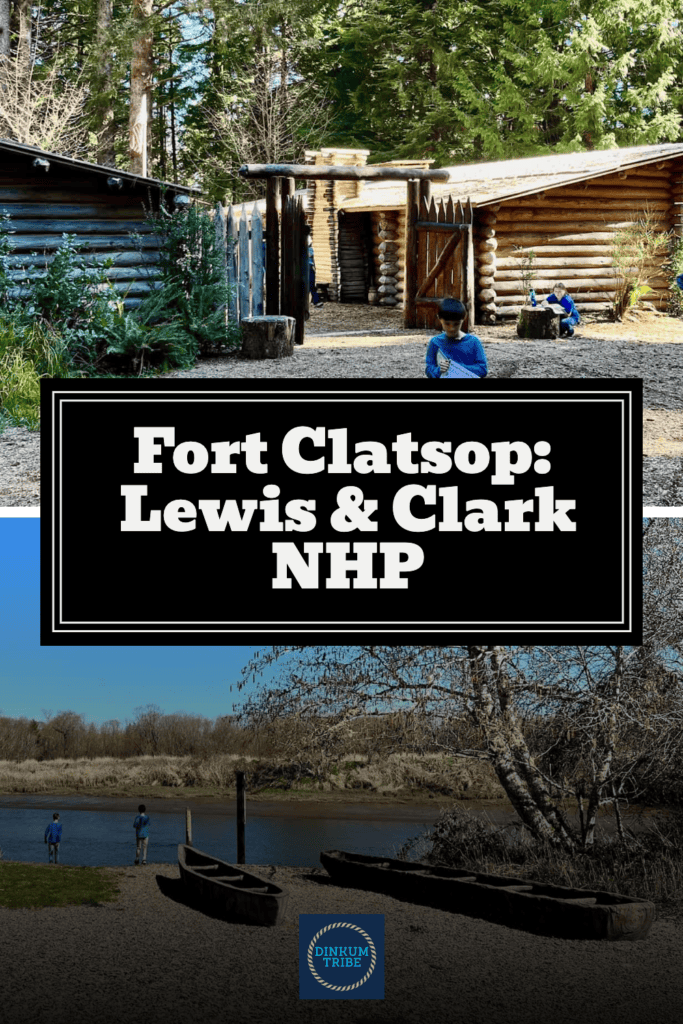
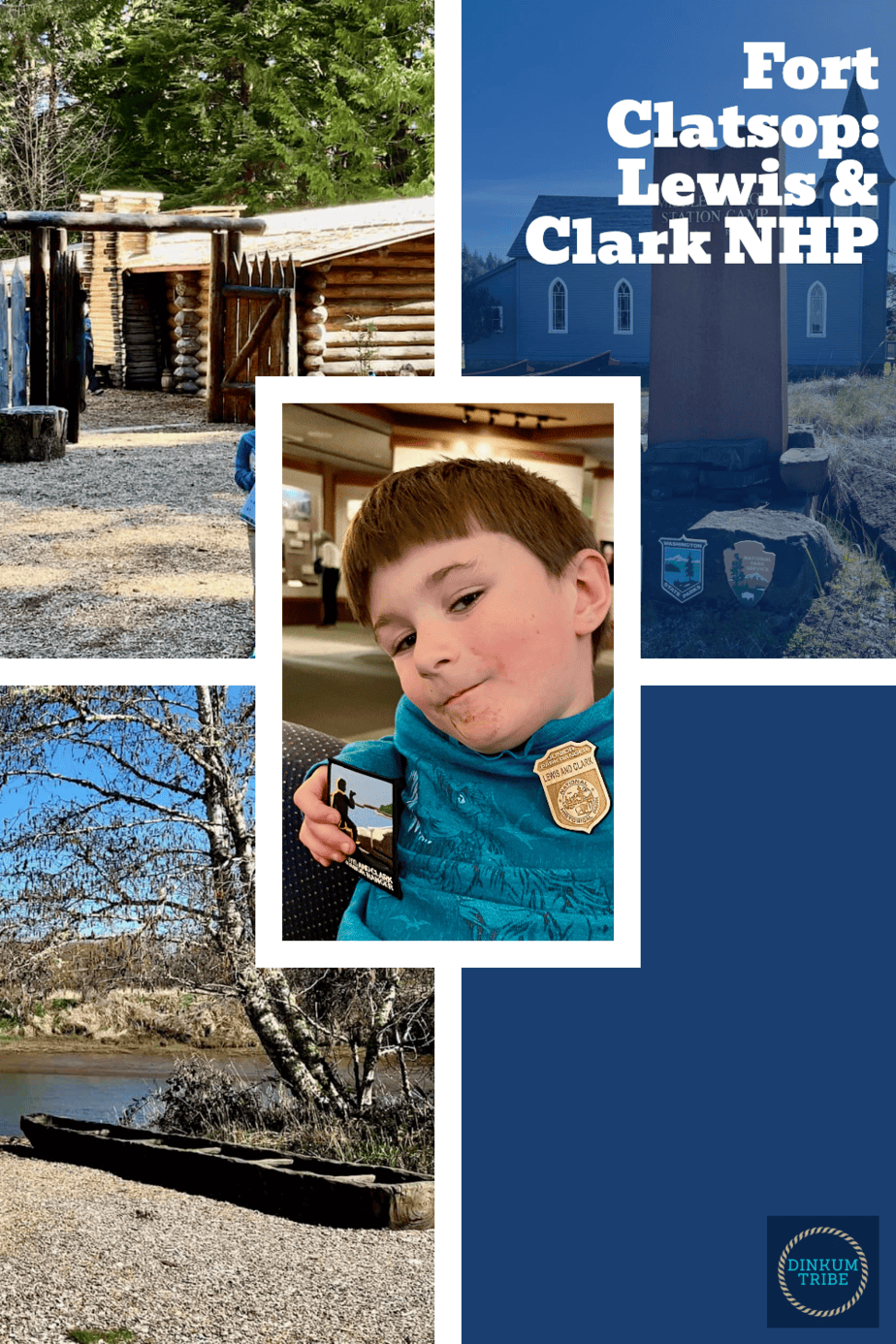
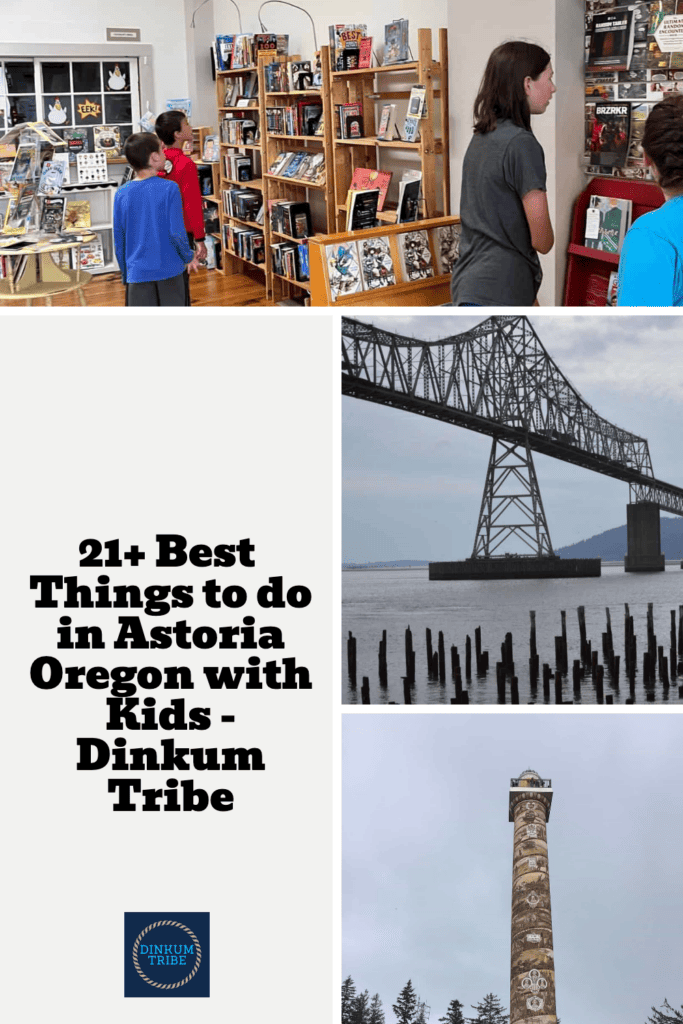
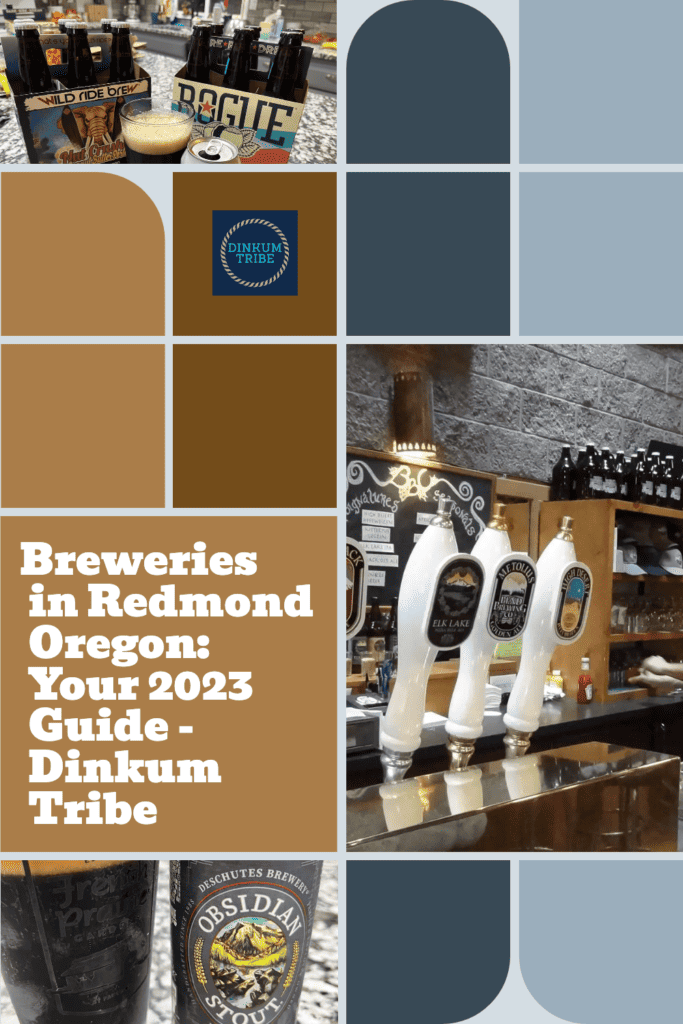
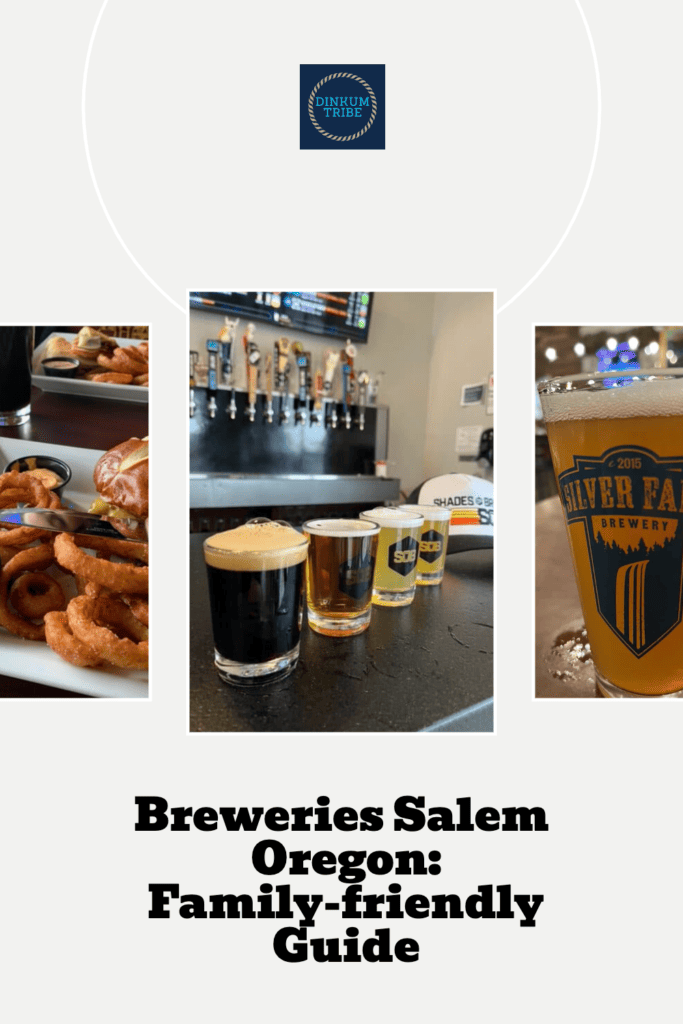
I love finding historic sites to explore when we are on road trips. It is so interesting to see how life was so many many years ago. This seems like a great park to both learn and explore.
I’m always surprised at how much history there is here in Oregon.
Would love to be back in Oregon, they have so much nature and national parks to discover and explore. Great photos you have here.
We love living in Oregon! Thanks for your comment.
This would be so much fun to visit. I loved watching Ken Burnes’ documentary on Lewis and Clark, and it would be amazing to see the locations where they and Sacagawea stayed at. Definitely putting this park on my bucket list.
There’s so many Lewis and Clark sites in this area of Oregon and Washington!
What a wonderful learning adventure and it looked so much fun too. Thank you for all the details. I wish I loved closer to Oregon.
Definitely a fun adventure!
This is a national park I hadn’t heard of but it’s one that seems like I could easily get here on the west coast. Looks lovely, and I’d like the historic trail and fort. Kayaking sounds like it would be a fun thing to do here too
We’re hoping to go kayaking near Fort Clatsop sometime too!
Oregon looks so beautiful, and Fort Clatsop National Park is no exception! I’ve actually never heard of this national park before so I’d really love to explore. Canoeing or kayaking sounds like so much fun! Thanks for sharing 🙂
Fort Clatsop seems to be a bit of a hidden gem among the National Parks.
This was a great overview of Fort Clatsop! Thanks for the post
Thanks for visiting!
Thanks for such a detailed guide! I would love the kayak tour.
Glad you enjoyed it!
Fort Clatsop National Park looks like great fun for the whole family. I’ve never heard of it, but it is worth saving if I am ever in that area, so thanks for sharing your experience.
It’s a great family-friendly destination.
So Fun! Even though we have been to Ecola and Cannon Beach several times, we’ve never stopped at Fort Clatsop. l love the replica forts, we will definitely have to check this out next time.
It’s such an interesting stop!
We’ll be in Astoria next month and are looking forward to checking out Fort Clatstop!
Hope you have a great trip!